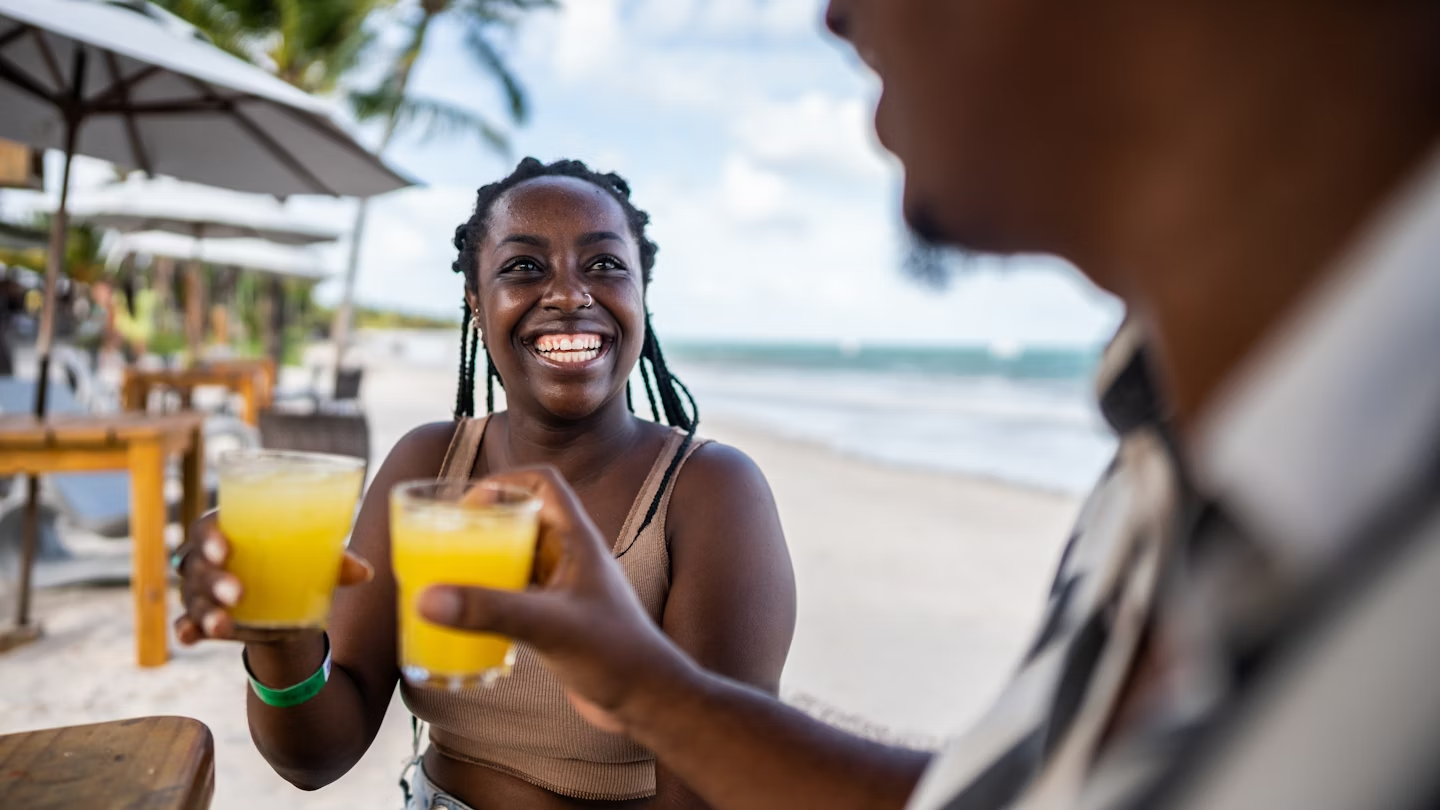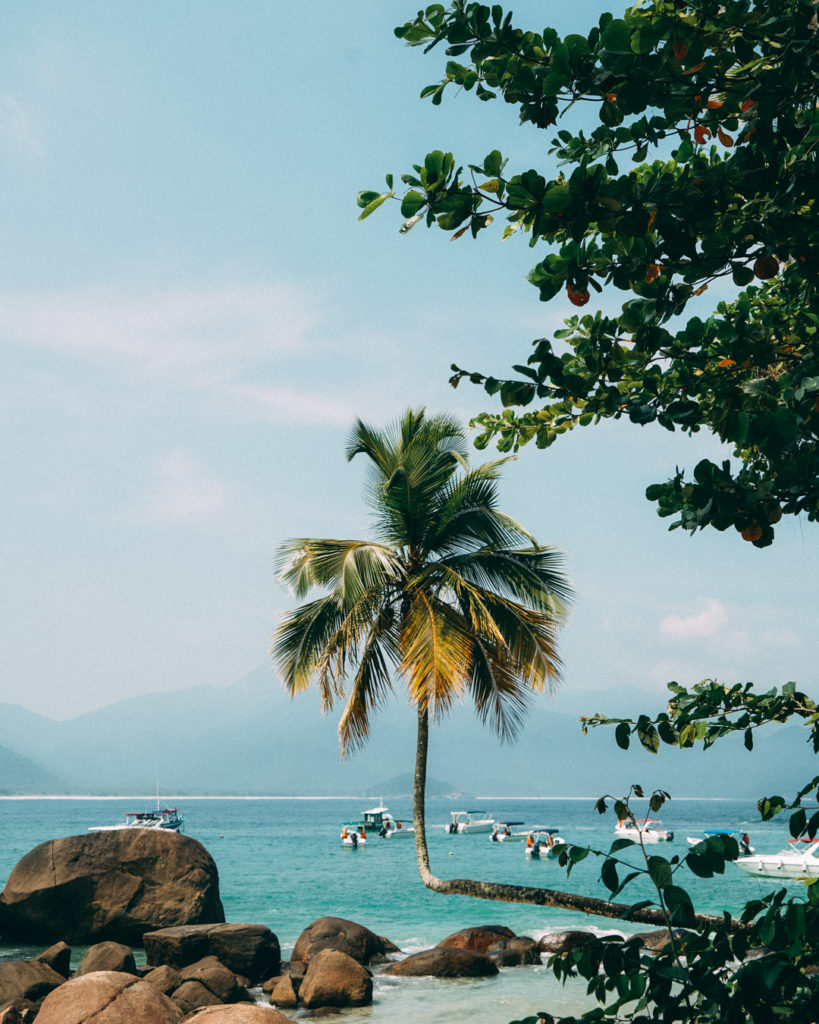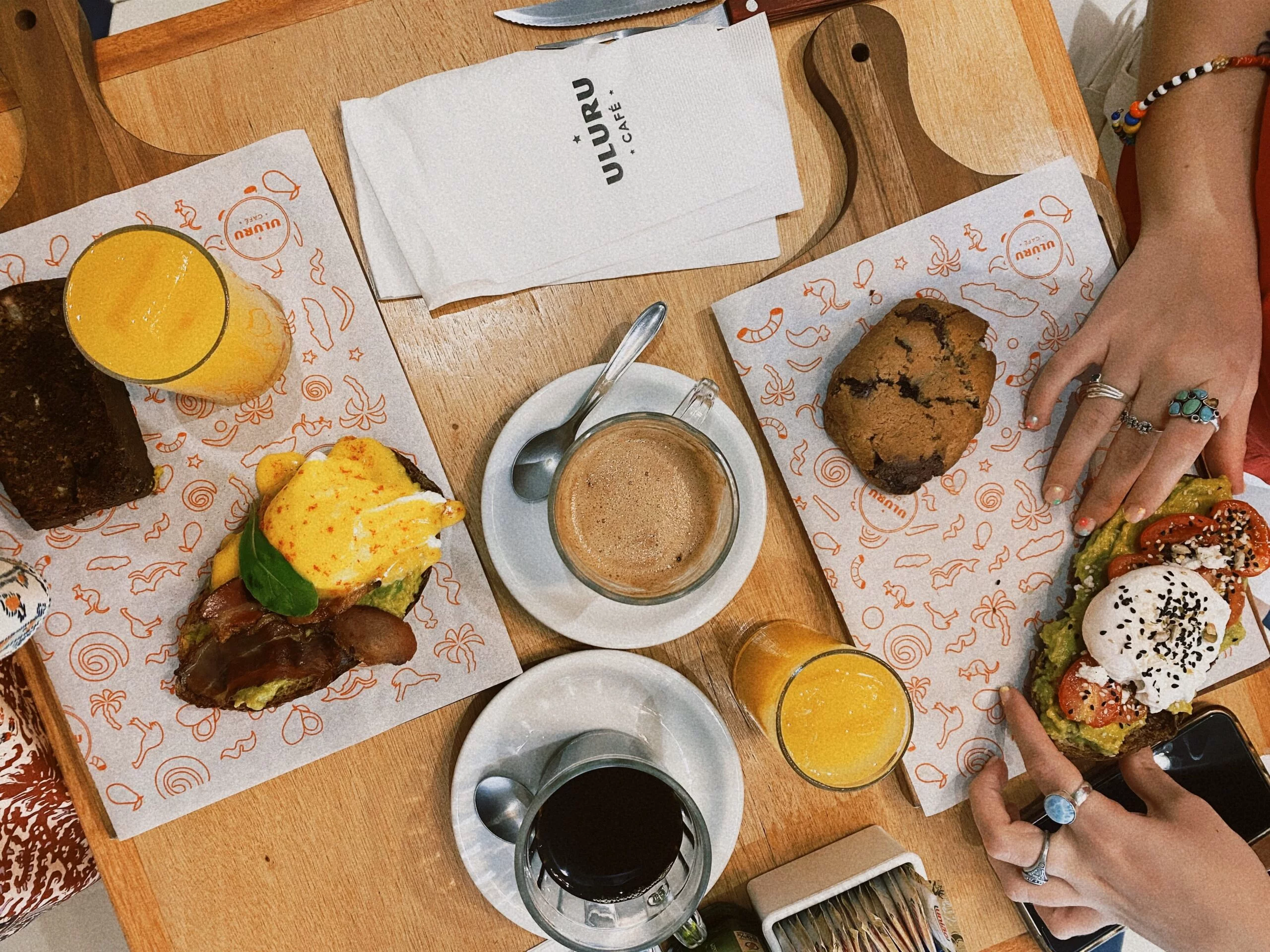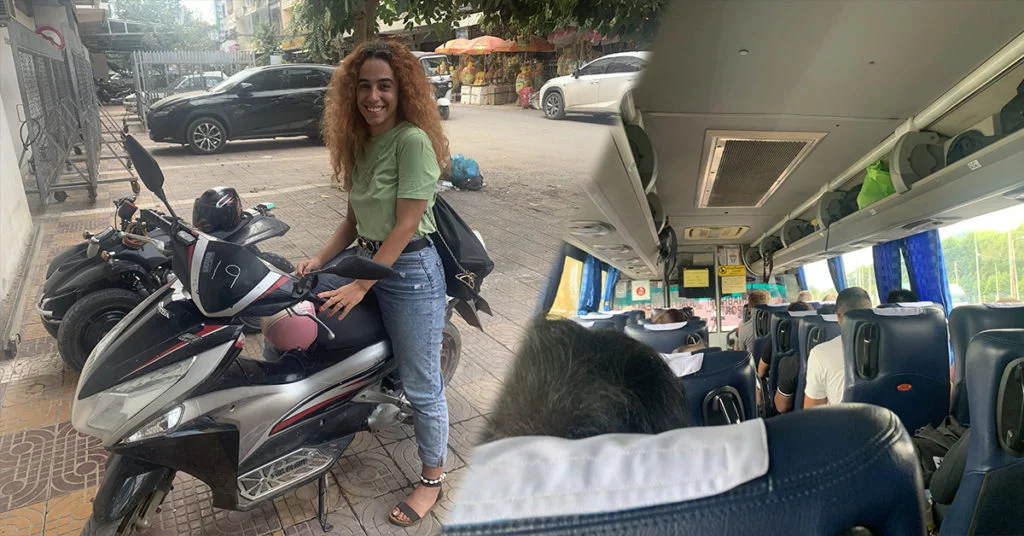

Travel Guide
- Things to Do
- Planning a Trip
- A Cultural Primer
- Food & Drink
- Recommended Books, Films & Music
- The Lay of the Land
- Regions in Brief
- Suggested Itineraries
Etiquette in Brazil
Be prepared for lots of skin-on-skin contact! Brazilians will often greet with a kiss or a hug, and both men and women will frequently touch you when speaking, either patting your shoulder or placing their hand on your hand or arm to make a point. In crowds, Brazilians maintain much less physical distance than North Americans normally find comfortable.
Greetings -- Shaking hands has become a more acceptable way of greeting someone, but don't be surprised if you are kissed on the cheek once (in São Paulo) or twice (in Rio and elsewhere), even when greeting someone to whom you have just been introduced. Men do not kiss each other, but greet with an open hug, using one hand to shake hands and the other to grab the man by the shoulder. These greetings are not only used between good friends and family members but are also quite common between business acquaintances.
Dress -- Brazilians, and particularly Brazilian women, have a reputation for colorful and sexy outfits. This certainly holds true in Rio, but in the south and the interior, people are more conservative. Novelist Jorge Amado has some fun with this, describing the arrival of a flamboyant Carioca woman in a small Bahian town: "The female creature, outfitted in totally exotic style, a kind of blue overalls with zippers and pockets and in the legs and arms, studded with flashy metallic grommets and nailheads, raised her helmet and revealed herself to be quite a dish. She drew off her gloves and with long fingers fluffed up auburn hair with a platinum streak in the middle, showing that she was either a Venusian or from Rio de Janeiro, and very exciting either way."
In business settings -- even in Rio -- men are expected to wear full suits, even when the thermometer hits 43°C (110°F). Women will wear smart business suits (either a skirt or pants is acceptable). The only other dress code applies to churches and government buildings (loosely adhered to in most parts but enforced with un-Brazilian ferocity in Brasilia): No shorts, tank tops, flip-flops, or miniskirts allowed. Anywhere else, smart-casual attire is more than enough; even shorts and a tank top are enough to gain access to most shops and restaurants.
Getting Things Done -- As informal and casual as Brazilians are in social settings, they can be strangely formal in a business situation: Titles matter and hierarchy is followed strictly. Often people in lower positions will be reluctant to make decisions on sometimes (in our eyes) minor issues. (One front-desk clerk refused to provide the hotel's website -- this was the marketing manager's responsibility.) Getting around such obstacles (Brazilians are famous for inventing seemingly pointless rules and procedures) involves a jeitinho (literally "finding a way"), a very Brazilian term used to describe the way one can get around a rule without really breaking it. Finding the appropriate jeitinho often requires creative problem solving; the best idea is usually to keep talking, keep suggesting things. Whatever you do, don't get angry. Brazilians avoid conflict and rarely raise their voices or show anger in public. This passive behavior can be frustrating in business situations, as Brazilians will rarely ever criticize or disagree with anyone.
Also note that unlike in much of Europe and North America, it can be nearly impossible to arrange anything over the phone. Most people do not have voice mail, and phone calls are often not returned. E-mail is becoming more common, but only as a follow-up. A personal visit is really the only effective way to get things done. Persistence usually pays off, and having a business card to introduce yourself or to leave behind can be helpful. Indeed, even when traveling to Brazil as a tourist, having some business cards with you can make a difference if you are trying to reach a hotel manager or an airline supervisor to solve a problem.
Note : This information was accurate when it was published, but can change without notice. Please be sure to confirm all rates and details directly with the companies in question before planning your trip.

- All Regions
- Australia & South Pacific
- Caribbean & Atlantic
- Central & South America
- Middle East & Africa
- North America
- Washington, D.C.
- San Francisco
- New York City
- Los Angeles
- Arts & Culture
- Beach & Water Sports
- Local Experiences
- Food & Drink
- Outdoor & Adventure
- National Parks
- Winter Sports
- Travelers with Disabilities
- Family & Kids
- All Slideshows
- Hotel Deals
- Car Rentals
- Flight Alerts
- Credit Cards & Loyalty Points
- Cruise News
- Entry Requirements & Customs
- Car, Bus, Rail News
- Money & Fees
- Health, Insurance, Security
- Packing & Luggage
- -Arthur Frommer Online
- -Passportable
- Road Trip Guides
- Alaska Made Easy
- Great Vacation Ideas in the U.S.A.
- Best of the Caribbean
- Best of Mexico
- Cruise Inspiration
- Best Places to Go 2024
- +55 (21) 9 9223 1260 [email protected] Our Opening Hours Monday: 07:30 – 20:00 Tuesday: 07:30 – 20:00 Wednesday: 07:30 – 20:00 Thursday: 07:30 – 20:00 Friday: 07:30 – 20:00 Saturday: 07:30 – 16:00 Sunday: CLOSED

- Methodology & Levels
- Teachers & Staff
- Accreditations & Testimonials
- Pictures & Videos
- Mais Caminhos
- Courses Overview
- Intensive Portuguese (20h)
- Combo 25 (25h)
- Latin Speakers
- Caminhos Talk – Conversation Course
- One-on-One Portuguese
- Rio Immersion
- Immersion Weekends
- Online Classes
- Other Courses & Services
- Student Visa
- Accommodation
- Airport Transfer
- Activities Overview
- Activity Calendar
- Volunteering
- Prices Overview

Cultural Etiquette in Brazil: Dos and Don’ts for Travelers and Expats
- Monday July 24th, 2023
- Posted by: Amanda Ennes
- Category: Brazil

When planning your trip to Brazil, it is essential to familiarize yourself with the cultural etiquette in Brazil. The country, with its rich history, vibrant culture, and diverse traditions, has a set of social norms and customs that may differ from what you are used to. To ensure a smooth and enjoyable experience during your visit, here are some dos and don’ts of cultural etiquette in Brazil.
Greetings and Personal Space
Dos: Brazilians are known for their warmth and friendliness. When meeting someone for the first time, a firm handshake, a hug, or a kiss on the cheek is common, even between men. Maintain eye contact during greetings to show respect and interest.
Don’ts: Avoid standing too far away or being overly reserved when meeting people. Also, refrain from using formal titles unless explicitly requested, as Brazilians tend to be informal and prefer a friendly approach. As a matter of fact, Brazilians call everyone by their first names: teachers, bosses, doctors, in-laws…
Pro tip: Brazilians will often touch you when speaking to you and hug you and kiss you when saying hi or goodbye. This is common for them even if this is the first time they have seen you. If you do not feel comfortable with that, just keep a distance and extend your hand in advance for a handshake to avoid hugs and kisses.
Dining and Visiting People
Dos: Embrace the culinary delights Brazil has to offer and enjoy communal meals with locals. When invited to someone’s home, it is polite to bring a small gift, such as flowers, chocolates, or a bottle of wine. If you are invited to an informal party or barbecue , bring a multipack beer. During meals, remember to compliment the chef. Moreover, as strangely as it seems, it is polite to arrive a bit late when invited to someone’s home. If you are invited to a party or gathering or even dinner, get there around 20 minutes after the designated time.
Don’ts: Avoid starting to eat before the host begins or leaving the table immediately after finishing your meal. Additionally, in restaurants, tipping is generally not expected in Brazil, as a 10% service charge is often included in the bill.
Additional reading: 10 Things You Need To Know Before Going To Rio de Janeiro .
Language and Communication
Dos: While Portuguese is the official language , learning a few basic phrases can go a long way in showing respect to the locals. Brazilians appreciate efforts to communicate in their language. Use friendly and open body language, as gestures play an essential role in the conversation.
Don’ts: Avoid making negative remarks about Brazil or its people. Please refrain from using Spanish phrases, as Portuguese and Spanish, while similar, are distinct languages , and Brazilians take pride in their linguistic identity.
Read more: Useful Brazilian Portuguese Phrases for Travelers.
Dos: Brazil’s climate can vary significantly depending on the region, but generally, the dress code is relaxed and casual. Light, breathable clothing is suitable for most occasions. Beachwear is acceptable at the beach, but always use some clothes on top of it in public spaces. In Rio de Janeiro, it is socially acceptable to wear flip-flops ANYWHERE. Yes, you can wear your Havaianas to a doctor’s appointment, to a walk around the mall, to a lunch date, to the beach, and even to your Portuguese classes at Caminhos .
Don’ts: Avoid wearing revealing clothing when visiting churches or religious sites. Also, leave expensive jewelry and accessories at home to minimize the risk of theft.
Read more: Is Rio de Janeiro Safe?
Respect for Diversity
Dos: Embrace Brazil’s cultural diversity and be open to learning about various customs and traditions. Respect the country’s history and the sensitivities surrounding certain topics. Respect race, religion , and sexual orientation .
Don’ts: Never make assumptions or perpetuate stereotypes about Brazilians or their culture. It is important to notice that not all Brazilians like football and samba and they do not like to be related to these all the time. Avoid discussing sensitive subjects like politics, religion, or crime, as they can be contentious topics. Watch teacher Jéssica’s series of videos on controversial topics in Brazil (Parts 1 , 2 , and 3 ).
Celebrations and Festivals
Dos: Join in on Brazil’s vibrant celebrations and festivals, such as Carnival . Participate with enthusiasm and immerse yourself in the local culture. Enjoy the music, dance, and festivities that make Brazil unique.
Don’ts: Avoid inappropriate behavior during festivities, and be mindful of personal belongings in crowded places. Respect local customs and rituals, even if you do not fully understand them.
An important cultural etiquette in Brazil is to shower every day. Remember to keep your clothes clean and smelling nice. Brazilians will notice if you do not shower every day and this might cause discomfort to them, either in school, work, or public spaces.
Cultural Etiquette in Brazil
Brazil is a country that celebrates diversity, embraces visitors, and offers an abundance of cultural experiences. By familiarizing yourself with the dos and don’ts of cultural etiquette in Brazil, you can make the most of your trip and create lasting memories. Remember, showing respect for the local customs and traditions will not only enrich your travel experience but also make a positive impression on the welcoming people of Brazil. So pack your bags, learn a few Portuguese phrases, and get ready to embark on an unforgettable journey filled with new encounters and discoveries. Happy travels!
Caminhos Language Centre is the largest and most exciting Portuguese school in Rio de Janeiro, Brazil. We have an excellent infrastructure, over 15 experienced Brazilian teachers, and a friendly multilingual support staff. We are the only school in Brazil able to offer Portuguese group courses throughout the year on 10 different levels . Moreover, our school also offers more than just Portuguese lessons for foreigners, we offer you the complete Rio de Janeiro experience. Every day we organize 100% free and fun activities for you to socialize and practice your Portuguese. We can also help you with a student visa for Brazil and accommodation in Rio de Janeiro . Follow us on Instagram for some Portuguese tips and news.
Leave a Reply Cancel reply
Currently you have JavaScript disabled. In order to post comments, please make sure JavaScript and Cookies are enabled, and reload the page. Click here for instructions on how to enable JavaScript in your browser.

caminhos_language_centre

- Portuguese Courses
- Intensive Brazilian Portuguese Course (20 Hours)
- VOLUNTEERING
7 things you should know before traveling to Brazil

Nov 8, 2023 • 5 min read

Keep these tips in mind and you'll have an incredible trip to Brazil © FG Trade / Getty Images
Just mention that you’re planning a trip to Brazil, and the idea will instantly conjure up images of sunny beaches and the infectious rhythm of a samba beat or the sultry melodies of bossa nova.
From the iconic yellow and blue kit of its national soccer team, the flamboyant outfits of the Carnaval dancers, and the famously fruity headpiece of Carmen Miranda, Brazil’s cultural impression on the world has been wide-reaching. But as a Brazilian-American it always surprises me how little others know about the vast country’s many diverse regions and day-to-day customs.
Growing up snacking on pão de queijo (cheese bread) and brigadeiros (chocolate truffles), I’ve been visiting Brazil since I was a kid and regularly return to visit family and explore new regions.
There are endless ways to experience Brazil, but these are the top things to know if you want to plan a trip to Brazil that goes above and beyond.

1. There’s more than just beaches and jungles
The energy of Copacabana Beach and the alluring biodiversity of the Amazon Rainforest may have captured the world’s attention, but that’s really the tip of the iceberg when it comes to Brazil’s natural beauty.
Adventurous nature lovers will find Brazil to be a treasure trove that contains a wealth of geographical diversity.
In the northeastern regions, you can explore the massive dunes and natural swimming pools in the states of Ceará and Maranhão or venture to the landlocked state of Tocantins, where a vast savannah is home to the remarkably unique park of Jalapão .
National parks like Chapada Diamantina and Chapada dos Veadeiros stun visitors with their mountain vistas and waterfalls, not to mention the staggering power of Iguaçu, one of the world’s largest waterfalls made up of over 200 cascades.

2. There are more urban hubs beyond Rio and São Paulo
While Rio de Janeiro boasts Brazil’s most iconic skyline and São Paulo is a mega-metropolis that hosts many of the country’s cultural and business institutions, these are hardly the only urban centers in Brazil worth visiting.
Architecture fans should plan a trip to the capital city of Brasilia , where the work of Brazilian architect Oscar Niemeyer takes center stage, while gastronomically inclined travelers should check out Belo Horizonte , the capital of Minas Gerais, a state renowned by Brazilians for its cuisine.
Up north, Salvador is a center for exploring the epicenter of Afro-Brazilian culture, which is the source of the martial art of capoeira and feijoada (a meaty bean stew), Brazil’s national dish.
3. Brazil is a cultural melting pot
The USA is hardly the only cultural stew in the Western hemisphere. Brazilian culture melds together the customs and traditions of the indigenous, Afro-Brazilan and immigrant communities.
In São Paulo, the neighborhood of Liberdade is home to a strong Japanese-Brazilian community; in southern states, you'll see the influence of German immigrants in the region's cross-timbered houses.
Even the food has Lebanese and Italian roots, with kibbeh (fried bulgar wheat and meatballs) and pizza being some of the most popular late-night snacks among Brazilians.
The national dish feijoada , originates from Afro-Brazilian and indigenous communities who used cassava flour long before the arrival of Europeans in Brazil. This flour is a key ingredient for farofa (toasted cassava flour), the most popular side dish to have with your feijoada .
4. A little Portuguese will be a huge asset
Outside of the traditional tourism sectors, you won’t find many Brazilians who speak English, and whatever your level of Spanish may be, it probably won’t get you far enough.
In addition to studying basic phrases , you should also prime yourself on pronunciation. For example, an r at the beginning of a word makes an h sound, which means the “rio” in Rio de Janeiro is pronounced more like “hio.”
It may seem like a small detail, but it’s an essential thing to be aware of should you ever need to ask for directions.

5. A kiss on the cheek is a customary greeting
In a social situation, a kiss on the cheek is the routine greeting among Brazilians – even if you’re just meeting someone for the first time.
It doesn’t need to be a full kiss, but cheek-to-cheek contact with a smacking sound is the standard. It’s typically expected between two women or a man and a woman, but men often opt for a handshake.
If the situation is more formal, like a business meeting or a simple shopping exchange, you can skip the kiss. The number of kisses also vary by region: in São Paulo it’s one, in Rio it’s two, and in Bahia , it can be three or more.
6. Safety should be top of mind in urban areas
Crime is a widespread issue throughout Brazil, especially in large cities and the favelas usually located in the city outskirts. Favela tours are possible, but the business is controversial as many people believe it to be exploitative and unethical.
Brazilians will generally warn tourists against wearing jewelry when out and openly carrying expensive electronics, especially phones.
This has happened to me many times when I’m out shooting photos, as many people stop to point to my camera with a concerned “ cuidado ” (be careful). Keep your wits about you in crowded areas – especially ones with many tourists – and avoid walking alone at night.
7. It’s illegal to drive in flip-flops
Even though Brazil is famous for its Havaianas , Brazilians are serious when it comes to road safety. Flip-flops can easily get caught on a car's pedals and cause accidents, so if you are caught driving with them, you may get fined. However, it is acceptable to drive barefoot if you don’t have any other footwear on you.
Explore related stories

Apr 19, 2024 • 6 min read
How do I play against a blackjack dealer? What should I wear? Are drinks really free? If you’re new to gambling in Las Vegas, we have your answers.

Apr 17, 2024 • 6 min read

Apr 11, 2024 • 6 min read

Mar 30, 2024 • 4 min read

Mar 30, 2024 • 5 min read

Mar 1, 2024 • 9 min read

Feb 23, 2024 • 6 min read

Feb 9, 2024 • 12 min read

Feb 7, 2024 • 5 min read

Feb 1, 2024 • 7 min read

Cultural Etiquette: Do's and Don'ts in Brazil

Discover the essence of Brazilian etiquette from social greetings and dining customs to business practices for an authentic cultural experience
As one steps into the kaleidoscopic world of Brazil, they are greeted by a cultural landscape as vibrant and diverse as the country itself. From the sun-kissed beaches of Rio de Janeiro to the bustling streets of São Paulo, Brazil's spirit is infectious. Yet, to truly immerse oneself in this dynamic society, understanding the nuances of Brazilian etiquette is key. It's a dance of cultural subtleties, where each step reflects respect and appreciation for this rich culture.
Greetings and Communication
In Brazil, greetings are an embodiment of warmth and friendliness. The typical handshake, while common, is often accompanied by robust backslapping among men and cheek kisses for women - usually a single kiss in São Paulo, but a pair in Rio de Janeiro. These gestures are not mere formalities but expressions of genuine sociability and openness.
Communication in Brazil is characterized by its expressiveness. Gestures are lively, and conversations are often filled with animated storytelling. Brazilians value direct yet respectful communication. They are not afraid to stand close and make physical contact during conversations, which might be a cultural adjustment for those from more reserved societies. But remember, this physicality is a sign of friendliness and trust in Brazilian culture.
Social Gatherings and Hospitality
Social events in Brazil are vibrant affairs, echoing the nation's love for celebration and camaraderie. When invited to a Brazilian home, punctuality is flexible. Arriving a bit late is often expected; it's the Brazilian way of keeping things casual and stress-free. However, do not mistake this for a lack of respect for time - it's simply a more relaxed approach to life.
Brazilian hospitality is legendary. As a guest, you are likely to be treated with utmost generosity and warmth. Embrace it, and don't hesitate to partake in the food and drink offered. This generosity is a fundamental aspect of Brazilian culture, a gesture of goodwill and friendship that is both heartwarming and sincere.

Explore the wonders of Brazil with our Ultimate Travel Guide!

“Embark on a transformative journey through Brazil with this indispensable Travel Guide. Unearth hidden gems, embrace vibrant culture, and let your soul roam free!”
David Wright
Dining Etiquette
Dining in Brazil is more than just eating; it's a social event. The cuisine, a melting pot of influences, is as varied as the country's landscape. At the table, Brazilians are relaxed yet mindful of basic manners. It's common to say 'bom apetite' before starting to eat and to keep your hands above the table. In Brazil, meals are a time for sharing and interaction, so don't rush; savor the food and the conversation.
In a nation famous for its churrascarias (barbecue restaurants), the Brazilian barbecue, or 'churrasco', is a culinary experience not to be missed. Here, a variety of meats are grilled to perfection and served at the table. It's a communal and convivial dining experience that perfectly captures the essence of Brazilian cuisine and culture.
As we continue to explore the intricacies of business etiquette in Brazil and conclude our journey, we gain a deeper understanding of the multifaceted nature of Brazilian culture. It's a culture that embraces with open arms, celebrating life with a vibrancy that's as infectious as it is inspiring.
Business Etiquette
In the realm of Brazilian business, relationships are paramount. Business dealings often start with lengthy discussions unrelated to work, as personal connections are considered essential. It’s a world where trust and rapport are valued above formal agreements. Punctuality in business settings varies; in larger cities like São Paulo, being on time is crucial, while in other parts of Brazil, a more relaxed attitude towards time is common.
Meetings in Brazil can be lively, with a conversational style that might seem informal to outsiders. This informality, however, does not detract from the seriousness of the business at hand. It's simply a reflection of the Brazilian way – open, relaxed, and always personable. In negotiations, be prepared for a certain level of flexibility. Decisions may take time, as the Brazilian business culture values thorough discussion and consensus.
When it comes to attire, Brazilian professionals dress smartly. In business settings, men typically wear suits and ties, and women wear elegant suits or dresses. It’s a mix of professionalism and flair that reflects the Brazilian spirit – serious yet vibrant.
Delving into the do's and don'ts of Brazilian culture reveals a tapestry of traditions and customs as colorful and diverse as the nation itself. From the warm and expressive greetings to the conviviality of dining and the personal touch in business, each facet of Brazilian etiquette offers a window into the nation’s soul.
Understanding these cultural nuances is crucial for anyone seeking to fully experience the richness of Brazil. It’s not just about navigating social and business interactions; it's about connecting with the Brazilian spirit. It’s about understanding a culture that thrives on warmth, expressiveness, and a deep sense of community.
As we walk the sunlit streets of Brazil, from the bustling avenues of its cities to the serene beaches of its coastline, let us embrace the cultural etiquette that makes Brazil unique. In doing so, we not only show respect for the local customs but also enrich our own experiences, creating connections that transcend the usual boundaries of travel and tourism. Brazil, with its open heart and vibrant spirit, offers a journey that is as enriching as it is exhilarating.
My Recent Articles

Cultural Etiquette: Do's and Don'ts in Russia
Cultural etiquette: do's and don'ts in thailand, cultural etiquette: do's and don'ts in mexico.

The Most Interesting, Useful Brazilian Customs & Etiquette

A tourist in Rio de Janeiro can ignore Brazil’s etiquette. A devoted learner can’t. In fact, understanding Brazil customs and etiquette—and some of their roots—is a solid path to richer contact with the language.
Because the etiquette of Brazil is fairly different from Portuguese etiquette, learning cultural etiquette in Brazil is a great opportunity to understand Brazilian people. After all, meeting new people and hearing different perspectives contributes to a richer life experience!

[The importance of family, and many more customs, are an open door to Brazilian culture.]
Traveling and getting to know different realities often reveals unthinkable life conditions and habits. Even though the cultures, concerns, and consumption habits worldwide tend to assume a growingly homogenic behavior in comparison to decades ago, there are so many countries in the world and still so many different people.
Getting to know new people and cultures always leads to surprises, both good and bad. That’s why we’ll present the do’s and don’ts of Brazilian etiquette and customs, also giving you a taste of each behavior’s roots and why things are done that way.

Table of Contents
- Dining Etiquette in Brazil
- Sightseeing Etiquette
- Brazil Greetings Etiquette
- Visiting a House
- Public Transportation
- Business Etiquette in Brazil
- Celebrations Etiquette
1. Dining Etiquette in Brazil
Do: Take Your Time Eating
The first of our Brazil etiquette tips is to respect the meal. If you’re not eating fast food and aren’t late to an appointment, take your time.
Brazilians don’t usually have a solid meal structure like Italians do, with a full course, seven-dish dinner. But they’ll eat calmly, even during lunchtime on work days.
While there are exceptions, it’s generally best to eat and leave room for the coffee afterwards—and participate in the small talk after the meal.
Do: Embrace Coffee
Coffee is at the core of Brazilian culture. After the scourge of slavery, it was coffee production and exports that boosted the Brazilian economy. Across the decades, the commodity’s prices and planting cycle have created obstacles to a sustainable production of wealth.
In spite of that, the country is still the world’s top producer of coffee —with more than three times the production of the famous Colombian coffee in 2019. The world’s biggest coffee cooperative is located in Guaxupé, in the state of Minas Gerais.
So, drinking coffee is a widespread habit in Brazil, especially during breakfast and after other meals, both during the workweek and weekend.
Brazilians usually drink sweetened coffee. While this isn’t part of the rigid Brazil table manners and etiquette, it is a habit. If you don’t like your coffee sweetened and you’re in a restaurant, your cup of coffee will probably come from the kitchen unsweetened. But in a workspace, it’s quite possible that the sugar will have been added already. Ask the waiter or the person who prepared the beverage about this detail just to be sure.
In Brazil, it’s not very common to ask for coffee with cream and other ingredients. Black Coffee is king, with Coffee with Milk and Pingado (basically a cup of milk with a splash of coffee) being distant seconds.
If you’re not into coffee, no problem. Just hang around and talk a little until your mates finish drinking this dark elixir.

[This dark elixir awaits for you after every meal]
Don’t: Pay if You’re Invited
If you’re invited to eat, don’t dare to pay! This Brazilian dining etiquette rule is more frequent in familial contexts or among older people; younger people tend to earn less and split the bill without much care for etiquette.
Don’t: Sit at the Head of the Table
This is one of the basic Brazil dining etiquette rules. It’s not exclusively Brazilian, but should be kept in mind while in the country.
The head of the table is “reserved” for the house owner or chief of family, so you’re not supposed to sit there. Only proceed to take that place if you’re invited to do so.
Also, there’s the following saying: “The seater at the head of the table pays the bill.” So, be prepared for the consequences!
Bonus: Brazilian Tipping Etiquette
Tipping in Brazil is always optional. Still, the tradition is to tip the waiter ten percent of the meal’s value. Most restaurants bill the client with both the “rough” value of the meal and with the tip added—clearly showing the different values so that you can make the decision. In some places, the employee will ask if you want to pay the ten percent just to be polite; if you say no, this may be considered rude.
2. Sightseeing Etiquette
Do: Keep it Basic and Watch Out While in Public
This is the saddest of all our Brazilian etiquette tips and is very important. It’s a beautiful country with abysmal violence rates. The announcement of 30,864 homicides in the first seven months of 2019 was considered an achievement compared to the 39,527 homicides registered for the same period the year before.
That’s how absurd the situation is—and theft crimes are even more common.
So, it’s prudent to avoid flashy clothes and accessories if wandering through public spaces, such as a crowded street or the beach. The catch is: there are items that foreigners don’t even understand to be flashy—but are. Some examples include:
- A metallic watch
- A smartwatch
- A cool jacket
- Silver/gold jewelry
- Fancy sunglasses
- A cell phone
This means that the dress code for sightseeing should be urban and basic. If you’re riding in a car , you’re safer and thus can be a bit more flexible with styling. If you’re going to the beach, carry just a few items (since you’ll have to watch them all the time) and pick flip-flops instead of shoes.
Cell phones are the most wanted item for criminals; they’re easy to take and profitable in the black market. Avoid making phone calls or reading text messages for longer periods of time while in the street. You can take pictures and talk once in a while, but look around before and be discreet. You can also enter a shop or restaurant to do so.
Do: Take it Easy with Schedules
Some tourist attractions, appointments, or meetings can take longer than expected. Some nations and cultures recommend punctuality. Britons are a proverbial reference in this aspect. In contrast, Brazil customs and etiquette tend to relativize this asset.
People can be late for meetings and appointments. Being five, ten, or even fifteen minutes late is generally not a problem in informal contexts. If you’re thirty minutes late, send a message and your friends will usually understand. Of course, if you’re late for the cinema screening, forget about that session.
But don’t mix things up: Brazil dating etiquette recommends that you don’t leave the person hanging for half an hour. This is especially true if you’re going to meet in a public space, since it can be dangerous to hang out on an empty street, building, etc.
Likewise, delays are generally not part of business etiquette in Brazil. Being a little bit late may be okay for things like meeting a coworker for lunch, but showing up late for negotiations, tests, workshops, conferences, or job interviews is out of line.
3. Brazil Greetings Etiquette
A little kiss on the cheek is especially normal in man-woman and woman-woman greetings . The etiquette for some states (Rio de Janeiro) is to kiss both cheeks, while others (São Paulo) recommend one kiss. But you can also find state etiquette that recommends three kisses (Minas Gerais).
To resolve this controversy, the Brazilian Ministry of Tourism has developed a very useful Mapa do beijinho (literally: “Little kiss map”), showing how many kisses are the norm for each state. That one embarrassment of meeting someone is now finally behind you!
Another great strategy is to wait and see how people are greeting one another. If the kiss is too intrusive and intimate in that context, a handshake is enough!
Do: Shake Hands
In Brazilian social etiquette, shaking hands is the most common greeting for formal occasions. In informal situations, it’s normally employed between people of the same sex.
Don’t: Freak Out When Hugged
While the hug can send a bad message and even sexual overtones, it’s relatively normal in Brazil, even among people who aren’t that intimate.
However, there’s a subtle way to differentiate between intimate hugs between friends and greeting acquaintances with a hug.
A warm hug demands contact with the torso and lacing your arms around someone else. A “half-hug” will only demand lacing one arm around someone and making contact with part of the torso (or only the shoulder).
You can make the “half-hug” even more distant by converting it to a handshake and a tap on the shoulder or arm of the person you’re greeting. This is ideal for business and formal environments.
4. Visiting a House
Do: Greet Everyone
In Brazil, guest etiquette demands that you greet everyone. You may think it’s redundant to do this in a room with lots of people, but a person may become offended if you don’t greet them warmly.
Don’t: Stay in Your Safe Zone
If they’ve called you to be a guest in their house, it means they’re sharing their intimacy with you. So, you can loosen up a little bit.
Make sure you observe and respect the family code of the house, but don’t be shy to talk, share some of your ideas, or take part in family activities like watching TV—with a family that was completely strange to you five minutes ago.
A barbecue is the perfect context to exercise this piece of cultural etiquette in Brazil. Meeting a new family, getting to know them while eating good food, and enjoying the afternoon together, is a great experience.
People will be interested in knowing the guest (you) as well. If you observe a lot and act polite, you’ll probably do fine. When in Brazil, do as the Brazilians do.
Don’t: Flush the Toilet Paper
You know what they say: Brazil bathroom etiquette is the best Brazil etiquette—not. Indeed, this tip of Brazil bathroom etiquette is a little awkward, but very important.
Most Brazilians place a little trash can beside the toilet in their bathrooms. You may feel confused about it or even find yourself attracted to its mystery (don’t look inside!).
Instead of flushing used toilet paper, it’s common to dump it into this little trash can. The trash can in the bathroom is disgusting, but the sewer system in Brazil is worse. The condition of the pipes is often not good and the water pressure allows only a little help to flush.
So, get used to the can, because flushing the paper can lead to bad—and even more disgusting—episodes.

[Excuse me, my friend: where is the little trash can?]
5. Public Transportation
Do: Be Active to Call Your Bus
Brazilian public transportation emulates the law of the jungle in many aspects. You’ll struggle to find a seat. People are not very polite. Often, you’ve got to camouflage and find an attitude of balance between dismissing ambulant vendors and not being a jerk.
Well, you have to be inside the bus before managing these issues.
Many countries have only tightly scheduled rides, and people don’t have to signal to the driver to board the bus. This is not the case in Brazil.
Picture yourself at the bus stop. As soon as you identify the bus you want to ride:
- Raise your arm in the air.
- Bend it a little toward the street.
- Sustain your arm until you’re completely sure the driver has seen you.
- Now, you can get in.

[After the procedure, you’re free to hop in and find a seat…]
Do: Mind the Importance of the Sun
When you’re picking a seat on the bus, figure out which side of the bus receives the most sunlight. Solemnly avoid it and take a seat on the other side.
Brazil is a hot country, and riding the bus under the sun is one of the worst experiences of the local public transportation, especially if the bus gets filled with people.
Don’t: Rely on the Taxi Driver
I’m sorry if you’re a taxi driver or know someone who is. If you ride a taxi without knowing the directions to your destination, you may be inviting someone to the depths of your wallet—it’s possible that you’re being scammed.
Take a few minutes to understand the course of the ride before getting into the cab. Get a general notion of the main avenues, so you can notify the driver if you notice something strange.
The rise of Uber, and other companies that navigate with software that shows the course, have made this process more transparent. But there’s always some smart guy out there, eager to get in touch with your money.
6. Business Etiquette in Brazil

Do: Dress Accordingly
Brazil business dress etiquette is paramount in the working place. The clothes are not much different from those in other countries, but in Brazil, the presentation is really important.
Generally, look sharp and clean. If you’re a man, shave or take care of your beard. Brush your teeth, take a bath. And keep it classic:
Man: Shirt, tie, blazer or suit. Leather shoes. Wear a classy watch, if you want.
Woman: Shirt and social pants or skirt, woman’s blazer. High-heel shoes. Some basic jewelry may be suitable.
Sure, the dress code isn’t like that in every workplace. Dress conservatively, at least until you understand the dress code better. This is the basic business etiquette in Brazil (and everywhere else), and it allows you to blend into the team, stylewise.
Always remember: clean looks, fresh clothes, and perhaps a little cologne are welcome everywhere.
Don’t: Criticize Co-workers
This is an important point of Brazil business meeting etiquette. You can sometimes share your personal impressions during professional meetings. However, criticizing ex-co-workers, your old boss, or people in general, is often understood as a strong negative point for you.

[Don’t share the grudge you hold against that terrible boss.]
Do: Accept Help from Locals
One of Brazil’s business downsides is the scandalous number of bizarre regulations. From business restrictions to very specific tax rules (often conflicting between state and federal spheres), doing business in Brazil isn’t easy. In fact, it’s easier to do business in Malawi than in Brazil.
Thus, here’s another important topic of business etiquette in Brazil: gather people you trust to help you in your business. Lawyers, accountants, and people that show useful abilities and regional know-how in your area are precious assets.
7. Celebrations Etiquette

Do: Casual and Clean
Be tidy if you’re going to a social event, especially a party. You don’t have to dress fancy, except if the ambience asks for it.
A person’s appearance is very important in celebrations. Shave your body hair and cut your nails. People love perfume or cologne, and you can always chew on mint gum. It’s not a matter of appearance over substance; it’s just that you care about the event and want to look your best.
Don’t: Be Shy
Shy people can suffer a lot with Brazil customs and etiquette. In social interactions, it’s extremely important to demonstrate enthusiasm and to interact with others. You don’t necessarily have to feel it, but it’s better to show it. Speaking louder, performing gestures, and employing physical contact are a few ways to do this.
If you’re not willing to pretend or to interact much, at least be funny or well-humored. Otherwise, chances are high that you’ll be considered rude or arrogant by the standards of cultural etiquette in Brazil.
Also, don’t feel offended if you’re interrupted by someone at a party or dinner. This is rude among many cultures, but in Brazil, interrupting someone is often a way of showing interest.
Do: Party Hard
People in Brazil really enjoy celebrations. Barbecues, big dinners, and parties are the most common examples.
One aspect of Brazil customs and etiquette in parties that feels strange to foreigners is the length of the celebration. People take a long time to prepare for parties at home. Then, they go somewhere to drink and “warm-up” (called, literally, esquenta ) for the festivities. Finally, they get to the party and it lasts a long time .
Some countries have strong restrictions regarding the functioning hours for bars and nightclubs, but this isn’t the case in Brazil. You may not be stepping into a rave, but dinners and parties generally demand some resistance, and even patience, during their later hours.
Also, gatherings in Brazil can get extremely loud. If you compare the volume of noise in a Brazilian restaurant to what you’d experience eating out in some other country, it doesn’t even make sense. There’s often the sound of the background music and the talking above it. It’s something unpleasant to overcome, especially for foreigners.
Do: Act Solemnly at Funerals
Some cultures are less formal when it comes to funerals, incorporating meals and the sharing of stories involving the deceased, like during in-house receptions. This is not the Brazilian funeral etiquette.
Be quiet, greet, and send condolences. Wear black. Prayers may be part of the process. If you’re not religious, you can consider taking part merely to transmit support and comfort to people who were close to the deceased. They’ll surely appreciate you being mindful of these Brazilian funeral etiquette rules.
8. Conclusion
Cultural etiquette in Brazil is complex, but it’s a matter that can be learned through daily experience.
Still, this article compiles some of the most relevant tips for Brazilian etiquette for foreigners. In order to broaden your cultural knowledge, we highly recommend that you take part in PortuguesePod101.com lessons.
This modern online platform gathers the most useful Portuguese lessons and blends them evenly with informal and cultural knowledge in a way that’s extremely hard to find elsewhere.
Explore PortuguesePod101 and find both free and paid resources on-demand for your learning appetite and practical needs. Brazilian customs and etiquette may be a long way from home, but PortuguesePod101 is only one click away!
Before you go, let us know in the comments how Brazilian etiquette differs from (or is similar to) etiquette in your country. We look forward to hearing from you!
Or sign up using Facebook
Got an account? Sign in here

How To Say ‘Thank you’ in Portuguese

Saying Hello in Portuguese: A Guide to Greetings in Brazil

How to Say I Love You in Portuguese – Romantic Word List

All You Need to Know About the Brazilian National Anthem

50+ Portuguese Classroom Phrases for Studying in Brazil

Top Portuguese Phrases You’ll Use in a Restaurant
How to celebrate april fools’ day in portuguese.
- Brazilian Holidays
- General Announcements
- Advanced Portuguese
- Portuguese Alphabet
- Portuguese Grammar
- Portuguese Lessons
- Portuguese Online
- Portuguese Phrases
- Portuguese Podcasts
- Portuguese Words
- Tips & Techniques
- Portuguese Language
- Portuguese Translation
- Feature Spotlight
- Speak Portuguese
- Success Stories
- Teaching Portuguese
- Team PortuguesePod101
- Word of the Day
Copyright © 2024 Innovative Language Learning. All rights reserved. PortuguesePod101.com Privacy Policy | Terms of Use . This site is protected by reCAPTCHA and the Google Privacy Policy and Terms of Service apply.

Brazilian Etiquette: Dos and Don'ts in Brazil

Travelling around the world without slip-ups: in this article, we show you twelve examples of do's and don'ts in Brazil to avoid missteps in the land of the samba.
All-day dining
You'll find non-stop service in many restaurants.
Ola tudo bem ?
Say: ' Ola tudo bem ?' (Hi, how's it going ?), wherever you enter.
Avoid traps in bars
Do not ask for your second caipirinha until you have finished the first one. The cachaca (cane rum) takes a little time to hit you...

Source : rioscenarium.art.br
Behind the wheel
Running a red light at night is tolerated!
There are only solutions
Dar um jeito = find a solution (Brazilians always have one).
On the beach
Don't go topless, but flip-flops are definitely allowed.

At a Restaurant
Tips are already included, but still welcome.
How to tan?
Don't lie down on the beach. Here, the locals tan sitting or standing!
Speak with your hands
Use your hands when you talk. Or just your thumb.
Surfing is King
Tonga or boardshorts, if you're not wearing surf shorts or trunks you're a gringo.
One dish is often enough for two.
You may also like
Research Report: Pat’s Trip to Brazil
Read the article
Five Best Bars in Rio de Janeiro
Sustainable Tourism in Brazil
Understanding your Needs
Our team of destination experts will start by getting to know you and your unique requirements for your holiday
Personalisation
We work with you to build an ultra-personalised holiday itinerary with your choice of accommodation, experiences and activities
Our Services
All of our holidays include little extras designed to make a big difference to your trip, from fast-tracking you through airport check-in and security to our network of local concierges.
+ 44 (0) 20 3958 6120

Brazilian Culture
Basic etiquette.
- The notion of respect is not extended to every ‘ fulano ’ (‘so-and-so’) one meets on the street or in a public setting. Brazilians will typically walk ahead in lines or cut people off when driving. This attitude, whilst common in the anonymous public space, differs from their attitudes of respect towards people within their own social circle.
- When it comes to queuing etiquette, the notion of ‘first come, first serve’ does not always apply. Cutting in line may be tolerated if the person who comes later believes they are more important than others in line, or they know someone who can assist with jumping the line. For example, ‘ doutor fulano ’ (‘doctor so-and-so’) may cut in front because the person serving is a patient of theirs. These intricate dynamics determine not only who is next in line, but also who generally excels in society.
- Given large family sizes and typically small living quarters, Brazilians are generally not demanding regarding their privacy. Within one family, possessions are typically thought to be communal and are shared amongst everyone. Thus, it is expected to be open about one’s possessions and space.
- Since Brazilians are generally easy going, the etiquette for visiting their home is quite casual and relaxed.
- It is considered to be impolite to arrive on the designated time. If invited to a Brazilian household, come no earlier than 15-30 minutes after the designated time.
- If you are offered a complimentary cup of ‘ cafezinho ’ (‘black coffee’), accept it unless you have a good reason to refuse. In Brazil, coffee is a symbol of hospitality and is widely consumed. Likewise, offer cafezinho to anyone who visits your home if it is possible.
- The purpose of dinner invitations or parties is primarily for socialising. In turn, people are not normally hasty to leave. Such invitations usually include time for conversing before, during and after the meal. Typically, guests will not leave before dessert and a cafezinho have been served.
- Generally, etiquette around food and eating is casual. However, there are a number of common practices.
- Some foods that may seem appropriate to be eaten and handled with fingers are not. Typically, people use napkins or toothpicks to pick up food.
- Brazilians often tend to eat quietly. Burping and making noise with plates and cutlery is considered to be poor etiquette.
- Brazilians tend to finish all the food they put on their plate. Taking more food than one can eat and leaving unfinished food on one’s plate is considered impolite, suggesting that the person did not enjoy the food.
- It is common to have a second serving.
- When eating out in a restaurant, often people will lift their hand and motion for the waiter to come to them.
Gift Giving
- Small gifts such as a chocolate bar are often given as a symbolic gesture of appreciation towards someone who does a favour.
- If invited into a Brazilian home, bringing flowers or a small gift for the hostess is a good gesture of appreciation. A gift for the hostess’ children will also be greatly appreciated.
- Flowers can be sent before or after a visit to someone’s home. Orchids are considered a nice gift.
- Wrapping gifts in vibrant colours will be appreciated, particularly if it is in the national colours of yellow and green.
- Gifts that are sharp such as knives or scissors refer to an intention to ‘sever’ ties with someone. Thus, avoid giving gifts that may be interpreted as a cutting of connections.
- Avoid giving practical gifts such as wallets, keychains or perfume. These are considered to be too personal.
- If a married man has to give a gift to a woman, he should mention that the gift is from their spouse to avoid the gesture being interpreted as flirtation.
- Avoid giving gifts wrapped in purple or that are purple, such as purple orchids. The colour purple is associated with mourning.
Get a downloadable PDF that you can share, print and read.
Grow and manage diverse workforces, markets and communities with our new platform

Brazil Culture – Learn to Flow with its People and Etiquette

Brazil culture is truly one of its kind in the world. It is a diverse mixture of old and new, unhealthy where its racial and ethnic groups come together to form a perfect blend of remarkable allure and friendly environment. Brazil is a land stunning beaches , pilule magnificent landscape, unique dance and music , the world’s largest rainforest, and friendly, generous people.
Brazil is rich in culture, excitement, history, and great food . They are offered to you in a relaxed, laid back manner that will make you feel like you’re a regular resident. Whether you’re in the country for brief visit or a longer stay, you will do well to understand Brazil culture and learn how to blend and flow with the Brazilian people and their etiquette.
Brazil Culture: Facts about Brazilian People
Brazil is predominantly a country of immigrants. It is a land of different ethnic groups that have come from Africa, Europe, Middle East, Asia, and North America. After many years working under colonial rule and centuries of mixed marriages, ethnic lines gradually disappeared and gave rise to a unique culture that defines the nation.
Brazil culture is a lot different from westernized countries, and it manifests itself in the personality and nature of the Brazilian people.
One of the traits that easily sets apart the Brazilian people is their sincere generosity which they offer abundantly even to total strangers. Actually, when you meet a Brazilian, don’t be surprised to be invited for a meal in their home. Even if it means spending their last real, Brazilians will offer their visitors food or refreshments. Whatever circumstance is presented, they like to share whatever they have even if they are short of cash or financially-challenged.
Religiousness
Brazilian people are hopeless optimists even in the face of difficult situations and hard financial times . Brazil’s population is predominantly Catholic, and holds an unshakeable faith in God that enables them to get through their life’s various trials. They are open and at home when they talk about spiritual matters, not like most other cultures that believe their relationship with the Creator is a private affair, and should not be displayed openly.
Family relationships
Brazilian people value their relationships more than money or material possessions . They are not so much interested in money if it means putting a relationship in trouble. Family lies at the very core of Brazil culture , which is why large families are more of the rule than the exception. Many social activities revolve around these relationships.
Laid back attitude
Brazilian people follow a laid back and unhurried lifestyle than those living in more developed nations , although this may not exactly apply to Brazil’s more westernized urban centers like Sao Paolo. With their passive “que sera sera” (what will be, will be) manner of thinking, Brazilians take life as it unfolds, taking the flow (and occasional blows) of life calmly and patiently.
Physical expressions
Brazilians tend to use physical contact when speaking with each other, thus you can expect them to touch your hand, arm or shoulder during conversation . Along with touching, they will also hug, kiss and enter your personal space when talking with you. Handshakes will take a little longer and they will stare straight into your eyes as they are holding your hand. Do not mistake that this has some sort of sexual connotation as this open-minded expression is part of Brazil culture .
Art and the love for soccer
Brazilian people are gregarious and are active in social circles. They can talk with you for hours without let-up particularly if the topic is about children, family and the all-time favorite, soccer. They prefer to conduct business in person and not through email or phone conversation.
Brazil culture richly depicts the Brazilian people’s love and appreciation for the arts. These are expressed through their local music, dance, poetry, literature and theater.
Brazil Culture: Learn Some Etiquette
When you travel to Brazil, you will do well to understand some basic etiquette so you’ll be able to express respect and appreciation in the proper manner.
- If you are invited for dinner in a Brazilian home, be sure to bring the hostess flowers or a small present . Brazilian people appreciate this gesture so much and will value you as a friend. Orchids are your best choice. Never give an item that’s black or purple in color, as these are seen as colors of grief and mourning.
- Don’t take punctuality too seriously . Actually, it is normal to arrive to an appointment or dinner at least a half hour late.
- Don’t dress shabbily. Just because you are invited to a poor section of the city, it doesn’t mean you can wear dirty denims and t-shirt. You need to show that your host’s hospitality is greatly esteemed and that you consider it an honor to be invited. While the occasion doesn’t call for you to dress up in a formal suit, you should by all means dress nicely.
Rich or poor, the people take pride of their Brazil culture and that will be clearly apparent the longer you stay in this friendly and welcoming country.
Related Posts

Natal Buggy Tours: Take a Wild Ride on the “Emotional” Side

Brazilian Musical Instruments

Natal Brazil Fishing: The Best Game Fishing Spots
Leave a reply cancel reply.
This site uses Akismet to reduce spam. Learn how your comment data is processed .

21 Jul 21 Dos and Don’ts to Travel Safe in Brazil

When I mention that I traveled to Brazil (majority of the time alone) one of the first questions I always get is, “Is Brazil safe to travel to?” Or more specifically, did I feel safe as a solo female traveler in Brazil. Both are fair questions, and my answer is…it’s complicated.
In short, yes, Brazil is safe enough to travel to – but read my more in-depth response here . My personal experience is that I had no negative incidents involving safety or theft while in Brazil and I loved the country so much I stayed for 3 months and would go back in a heartbeat. However , I simultaneously know many tourists who were victims of theft in Rio de Janeiro especially.
You could call me lucky that nothing happened to me, which is fair because sometimes things just happen. But I was also extremely cautious and extremely aware. Specifically, I followed the tips mentioned in this blog post and I think that made a huge difference.
So if you’re traveling to Brazil, here are 21 dos and don’ts to stay safe:

*This post includes affiliate links and I may receive a small commission at no additional cost to you. By using my links you’re merely supporting what I love to do: write this blog! I only recommend products/companies that I use myself.
1. pull your phone out on the street
Walking around with your phone out is really the worst possible thing you could do – especially in Rio. No matter how hard you grip that phone, there’s a decent chance someone will swipe it even in broad daylight. If you must look at your phone (for example directions or ordering an Uber), I recommend stepping into a shop. If that’s not possible, step away from walking traffic and look around before pulling it out quickly. If you’d like to take a photo, consider if it’s a smart move and be conscious of people walking by.
This is by far the most important tip on this list. I think we’re so accustomed to pulling out our phones constantly to scroll through social media or just walking with our phone in hand. But in Brazil I strongly discourage you from doing this.
2. Don't walk alone at night
Walking alone at night makes you an easy target, especially in places like Copacabana in Rio, so try to avoid it at all costs.
During the day, it’s obviously okay to walk alone, but it’s good practice to be mindful of your surroundings and the area you’re in. I wouldn’t recommend walking near a favela alone and suggest staying in more populated areas.
3. don't Put valuables in your pockets
If you’re in the habit of putting valuables in your pockets – break it! This is an easy way to be pick-pocketed. Instead I highly recommend having a cross- body sling. A standard sling like this one works, but for safety I most recommend the PacSafe sling which is an excellent investment if you travel often or live in a city.
4. don't wear showy items like gold jewelry
Flashy items make you a target in Brazil. Personally I love gold jewelry, but even though all of mine is fake, wearing it would make me a target. Studs and small hoop earrings should be fine, but necklaces and bracelets I would refrain from wearing – as recommended to me by local Brazilians.
5. don't leave your valuables unattended to
Never leave your valuables unattended to in Brazil. This includes at coffee shops where you may have your laptop or iPad out while going to the bathroom. It’s not to say that the people around you are bad or won’t watch your things when you ask, because they will. But usually when we ask someone, “Hey can you watch my stuff?” we don’t actually believe someone is going to come and swipe our stuff while you’re gone and the person watching your things will actually need to run after them… However, in some places of Brazil this can totally happen. Especially if you’re sitting near a window near the street. I knew of a girl who lost her iPad this way..so just don’t do it.
6. don't use the metro at night
The metro in Sao Paulo and Rio de Janeiro are great. I took the metro in Rio many times and it was cheap, safe, and clean. However, I wouldn’t recommend it in two scenarios: at night and with a laptop or camera. Otherwise I actually recommend it during the day especially if you’re on a tight budget.
Now that you know what not to do to stay safe in Brazil while traveling, let’s jump into what you should do.

Also read: The Ultimate List of things to do in Rio de Janeiro
7. pack a theft-safe cross body bag.
A lot of pick-pocketing happens when someone’s wallet or phone is in their pocket or open bag. Do yourself a favor, and get yourself a sling, cross body bag so that your valuables are always zipped away and close to your chest.
My favorite cross-body slings are from Pac-Safe . They’re RFID blocking, have theft-proof zippers, and cut-proof straps. They check all my boxes for a safe cross-body travel sling including having inside zipper compartments and a clip in the front vs. in the back.
But if you’re looking for a cheaper option, I suggest this highly-rated one on Amazon .

8. Be cautious of your valuables while sunbathing on the beach in Rio
The beaches in Rio are stunning, but while sunbathing be wary of your belongings. I recommend keeping everything in your bag (i.e don’t leave your phone or kindle out on the towel) and have your bag secured somewhere. Personally, when I would close my eyes I put the strap around my arm so my bag could not be grabbed in passing.
If you go to the beach alone (which I did often) also don’t leave your valuables unattended when you swim. I use a waterproof fanny pack or you can ask someone to watch your things if you feel comfortable doing so.

9. leave one bank card in your suitcase
When you go out, it’s best not to bring all your bank cards in case, god forbid, your wallet is stolen. I always leave my debit and credit cards locked at my place and take only one travel credit card. The Chase Sapphire Preferred is my go-to.
Read more about why I recommend the Chase Sapphire Preferred card here.
Note: this tip is good practice always when you travel, not just in Brazil.
10. Use Uber if possible
Uber is a really convenient way to get around, and for safety reasons I love it because you have more control as the passenger: you have a set price, the information of the driver, and you can share your trip for added security. Uber is available in the major cities of Brazil, so if it makes you feel safer, use it.
11. Leave your passport in a safe place, and bring copies to the country
Whenever you go somewhere (unless it’s required or needed) it’s best to not walk around with your passport in your day bag, just in case you lose it. But in the worst case scenario that you do, it’s also good to travel with printed copies in your suitcase if you needed to go to your embassy for a lost passport.
12. Bring minimal stuff when you go out to party
Now that I’ve mentioned to leave your passport and any unnecessary cards locked at your place, make sure you DEFINITELY do this when you go out to party in Brazil. This is when many people are pickpocketed because they’re drunk or high and less mindful. I know some people who even use burner or their old phones when partying in “high-risk” destinations like Rio or Salvador during Carnaval. Not a terrible idea if you have an extra or old phone.
13. Try not to stand out as a tourist too much
Being a tourist is not a bad thing and to be honest, even if you try not to stand out, you probably still will. And that’s okay! It’s more about not standing out too much and making yourself a massive target for pick pocketing. So don’t wear flashy items, be protective of your phone and camera, and maybe switch your “I Love Rio” shirt for a Flamengo jersey (Flamengo is a local and very popular team in Rio de Janeiro).
14. Practice extra caution in heavily touristic areas
Touristic areas of every destination always have a downside…they seem to attract the most sketchy characters. This is the same for Brazil. For example, in Rio you should practice extra caution in Copacabana, Lapa and other touristic places.
15. Be mindful of your things at an outdoor restaurant
When seated at an outdoor restaurant (which will happen often because Brazil loves al fresco dining), again be mindful of your things. Don’t plop your phone on the table and swing your purse over the back of your chair which faces the street. This behavior may be a habit to you, but like all the other tips in this list – think about your valuables and make sure they’re secured and can’t be swiped.
16. Avoid deserted areas
In general, it’s best to stay away from deserted areas. When you’re alone there’s no one to help so it’s always best to stay where others are too.
17. Double check the area of your accommodation before booking
Before booking your stay, it’s always good practice to do a little research on the area and read reviews from other travelers with location safety in mind.
18. Party safely
Partying in Brazil is not only a must, but a difficult thing to avoid. And as someone who was there for two Carnavals, I full heartedly support this! Just make sure you party safely by:
- Going out with people you trust
- Leaving any unnecessary valuables locked at your stay
- Keeping everything in a zipped sling
- Being mindful of how much you drink
- Having a plan how to get home
- Don’t do random drugs off the street
- Don’t ever leave your drink unattended and then drink it
- Don’t accept a drink you didn’t see poured
You’re an adult, you know the drill.
19. Use lockers and padlocks for your belongings
If you’re staying in a hostel this is always a must for your valuables. I recommend using this padlock which works for both lockers and your luggage and is TSA approved.
If you’re staying in an Airbnb or hotel, for some peace of mind you should also lock your things in the safe if available.
None of this is specific to Brazil, it’s just standard practice. Theft from your accommodation isn’t common for tourists in Brazil, although there are wild stories around Carnaval time when the country is full of tourists, so best to be cautious.

20. Be careful when you withdraw money
Like many destinations, in Brazil you should always be careful when withdrawing cash. I recommend only doing so during daylight hours, going with a friend if you can, and trying to find an ATM located indoors. As a standard practice (since seeing those ATM scamming videos) I also always tug on the card reader first and only go to an ATM when I see someone else go before me. That way if it’s going to eat a card, it won’t be mine!
After withdrawing money, make sure you have plans to return to your place immediately so you’re not walking around with loads of cash on you.
21. Make sure you're covered with Travel insurance
Travel insurance is a must for every trip, but especially for a destination like Brazil where you may be engaging in adventurous activities, have a lot of reservations, and you’re at risk for theft as mentioned in this post.
So do yourself a favor and make sure you’re covered! No one wants to think about unfortunate scenarios like robbery, delays, cancellations, injury or sickness happening while traveling, but they do and almost every traveler can attest to a time when travel insurance really saved them.
Check out World Nomads travel insurance here which is made for backpackers.
*Disclosure: World Nomads provides travel insurance for travelers in over 100 countries. As an affiliate, I receive a fee when you get a quote from World Nomads using this link. I do not represent World Nomads. This is information only and not a recommendation to buy travel insurance.

I’ve mentioned a lot in this blog post, but all of it will prove useful to staying safe in Brazil. Overall, I hope I didn’t scare any readers; I think Brazil is a wildly amazing place and one of my all-time favorite travel destinations. Just stay aware, stay safe and you’ll have a smooth and wonderful trip.
Also read: The Ultimate List of Things to Do in Rio
More resources for your trip to brazil:.
Planning your own trip? Here’s everything I used to book and coordinate my itinerary through Brazil.
If you’re a budget traveler or looking for an easy way to meet others, Hostelworld is the best place to search.
Booking.com has so many options in Brazil from affordable to more luxurious stays.
Flights to Brazil and within Brazil can be pricey if not booked ahead of time. To get the best prices I recommend using Skyscanner . The cheapest airport to fly into will most likely be São Paulo, but if visiting Rio de Janeiro it’s worth it to fly directly there.
No matter the destination, I always check Rome2Rio to see options on how to travel. However I found using Brazilian bus companies to book could be a pain because you need a CPF often. The most useful sites to me were BusBud & FlixBus .
Travel insurance is a must for every trip, and I highly recommend it for Brazil. My go to is always WorldNomads which is made for backpackers. You can search for coverage here .
Tours & Experiences
There’s a lot of free thing to do in Rio but joining a tour does have its advantages, and if you’re a solo traveler looking to meet people then tours are a great option. In Rio you can find awesome experiences on GetYourGuide , Viator , & Airbnb Experiences (hit or miss but mostly good).
Liked this post? Pin it!

Related posts

Carnival Rio de Janeiro 2024: Your Guide to the World’s Largest Party
Carnaval in Rio de Janeiro is one of the world’s biggest parties! Brazilians in costumes dance in th...

21 Dos and Don’ts to Travel Safe in Brazil
When I mention that I traveled to Brazil (majority of the time alone) one of the first questions I a...

The Ultimate List of Things to Do in Rio de Janeiro
Rio de Janeiro is one of the most amazing cities to visit in the world. It’s one of the few......
Bea Adventurous
I’ve heard a rio can be bad with theft so these tips are really helpful so thank you! I definitely think it shouldn’t deter anyone from visiting but to take these precautions for sure! Thanks Caroline!
Caroline Rose
You’re welcome!! So glad you found these helpful. Have the best time in Brazil!
Mary Candler
Thanks for your information about Brazil. I am hoping to go to Rio to volunteer as a English teacher for 3 weeks then head to Minas Gerais to see a friend. Any specific comments for a 70 Yr old who doesn’t take too many risks and has done a fair amount of solo travelling. I’ll be staying in medium hotels when not in the volunteer programme.
Hi Mary! I don’t have any specific safety recommendations other than what I’ve listed here. As for things to do, there are some really great tours I think you’d enjoy like to Christ the Redeemer and Sugar loaf mountain. Also check out the botanical garden, it’s beautiful! I have a full list of things to do in this blog post!
David Young
So how do you take photos? I love taking photos with my phone when I’m traveling. It sounds like that would be risky at most outdoor locations in Brazil. Also how was intercity travel? Did you take buses or fly? I know not to take the bus at nighttime, but I wonder if there are other precautions advised. Thank you.
Save my name, email, and website in this browser for the next time I comment.
Subscribe me to Caroline Rose Travel
This site uses Akismet to reduce spam. Learn how your comment data is processed .


- +44 0330 027 0207
- +1 (818) 532-6908
- [email protected]
- e-Learning Courses Online

- You are here:
- Resources /
- Country Guides /
- Brazil Guide
Olá! (Hello) and Welcome to our Guide to Brazilian Culture, Etiquette & Business Practices
In the 5th largest country in the world, where the population are all immigrants and where untouched indigenous tribal peoples still roam the jungles, it can take some time to get your head around brazil, what will you learn about brazil.
This guide will give you an understanding of a number of key areas including:
- Religion and beliefs
- Culture and society
- Social etiquette and customs
- Business culture and etiquette
Buy an In-Depth Country Insight for Brazil
For those needing a more detailed and comprehensive overview of Brazil you can buy our expert Insight Report on Brazilian Society, Culture & Business .
The 35-page PDF document has been authored by one of our Brazil country specialists and provides readers with much more detail that our free guide below. Topics include:

- An introduction to the country, its history, politics, people and culture
- Insights into the country’s values, customs and etiquette
- Tips on preparing to work with new colleagues from Brazil
- Expat-orientated information on daily life
- Guidelines and tools on adapting and dealing with cultural differences
All for only $7. Order via the button below to receive your Brazil Insight via email or learn more about the guide and its contents here
- Order It ( $7.00 )
Skip to a section or scroll on...
- Facts and Statistics
- Introduction to Brazil
- Language in Brazil
- Brazilian Culture & Society
- Social Customs & Etiquette
- Business Culture & Practice
STEREOTYPES
Remember this is only a very basic level introduction to Brazilian culture and the people; it can not account for the diversity within Brazilian society and is not meant in any way to stereotype all Brazilian people you may meet!
FACTS AND STATISTICS
- Location: Eastern South America bordering Argentina (1,224 km), Bolivia (3,400 km), Colombia (1,643 km), French Guiana (673 km), Guyana (1,119 km), Paraguay (1,290 km), Peru (1,560 km), Suriname (597 km), Uruguay (985 km) and Venezuela (2,200 km)
- Capital: Brazilia
- Flag: The flag of Brazil – (‘Bandeira do Brasil’) is known as the ‘Yellow and Green one’ and features a yellow diamond on a green field. In the centre of the diamond is a blue star- studded globe which is encircled by a white strip bearing the national motto – ‘Ordem e Progresso’ which means – order and progress.
- National anthem: The national anthem of Brazil was originally composed as an orchestral piece by Francisco Manuel da Silva (1795-1865). It was not until 1922 that the lyrics, penned by Joaquim Osorio Duque Estrada, (1870-1927) were officially adopted.
- Nationality: Brazilian
- Ethnic Make-up: White (includes Portuguese, German, Italian, Spanish, Polish) 55%, mixed white and black 38%, black 6%, other (includes Japanese, Arab, Amerindian) 1%
- Population : 212,559,417 million (2020)
- Population growth rate: 0.75% annual change (2019)
- Climate: Although the climate is mostly tropical, it is temperate in the south
- Time Zone: Brazil is a vast country with four standard time zones which are as follows: UTC – 2.00, 03.00, 04.00, 05.00. The Southern and Central Western States are the only area that observe daylight saving times
- Currency: Brazilian Real
- Government: Federal Republic
- Internet Penetration: 71% (2020)
- Business Culture: Ranked 33rd in The Business Culture Complexity Index™

Christ, The Redeemer. The iconic statue overlooking the city of Rio. Photo by Marcos Paulo Prado on Unsplash
INTRODUCTION TO BRAZIL
Brazil achieved independence in 1822 having been subject to Portuguese rule for more than three hundred years. They remained under imperial rule for 67 years until the military proclamation of independence in 1889 which followed the abolition of slavery in 1888.
From this point, there succeeded a period of political and social turmoil with the Paulista Coffee Oligarchy dominating the political scene. In 1930, the populist dictator, Getúlio Vargas, overthrew the Old Republic thus giving way to what became known as the ‘Vargas Era’. Brazil was hence drawn into more than fifty years of populist and military government until 1985. The military regime was peacefully settled and power placed into the hands of civilian leaders.
Brazil managed to surmount a difficult period of financial and social problems in the latter half of the last century. In 2013, the economy was failing and there was a huge rise in unemployment and inflation. The President, Dilma Rousseff, was impeached in May 2016 after a political scandal.
LANGUAGE IN BRAZIL
Language is one of the strongest elements of Brazil's national unity with Portuguese the spoken language of nearly 100 percent of the population.
The only exceptions are some members of Amerindian groups and pockets of immigrants (primarily from Japan and South Korea), who have not yet learned Portuguese. The principal families of Indian languages are Tupí, Arawak, Carib, and Gê.
There difference between the Portuguese spoken in Brazil and that spoken in Portugal comparable to the differences in English spoken in the United States and that spoken in the United Kingdom. Within Brazil, there are no dialects of Portuguese, but only moderate regional variation in accent, vocabulary, and use of personal nouns, pronouns, and verb conjugations. Variations tend to diminish as a result of mass media, especially national television networks that are viewed by the majority of Brazilians.
A woman takes a break from rolling cigars to have a few puffs. Photo taken in São Félix, Brazil by Rosino on Flickr (CC BY-SA 2.0)
BRAZILIAN CULTURE & SOCIETY
Religion & beliefs:.
- Brazil is predominantly a Roman Catholic country with an estimated 65% of the population affiliated to the religion.
- Catholicism’s beliefs and practices tend to vary throughout this vast country particularly in rural areas where the Saints of the Church are honoured with a vow of pilgrimage.
- When the Portuguese colonized Brazil, they brought with them the religion which met with the religious traditions of the indigenous population and those of the African slaves, thus giving way to syncretic practices in some areas.
- Symbolic of Brazil’s religious affiliation is the colossal statue of Christ the Redeemer that stands on the summit of Mount Corcovado in Rio de Janeiro.
Major Celebrations/Secular Celebrations:
- Jan 1st - New Year’s Day
- April 21st – Tiradentes – The anniversary of Joaquim José da Silva Xavier (known as Tirendentes); a national martyr who led the inconfidencia Mineira which constituted a revolutionary attempt to gain independence in 1789
- Easter Sunday and Good Friday – The dates vary each year as they are driven by the lunar calendar. In some parts of Brazil Easter is celebrated in the autumn May 1st – Work Day
- September 7th – Independence Day (based on the declaration of independence from Portugal in 1822)
- October 12th – Children’s Day
- November 2nd – Day of the Dead
- November 15th – Republic Proclamation Day – (remembers the end of the Empire and the commencement of the Brazilian Republic 1889)
- December 25th – Christmas Day.
The Family:
- Family is of paramount importance to the Brazilian people and grown up children often remain with parents until they marry.
- Extended family members tend to keep close ties with one another and elderly parents are looked after, often living with one of their children.
- Historically, family sizes were quite large but in recent decades people are having less children, particularly in the more urban areas.
- Similarly, marriage was very much a religious observance and legally binding. However, in the last four decades, attitudes have changed and civil marriage is becoming more common.
- Divorce was not legalised until 1977 due to opposition from the Catholic Church.
Social Stratification:
- Despite the mixing of ethnicities, there is a class system in Brazil.
- Social discrimination on the basis of skin colour is a common occurrence and, in general, people with darker brown skin are economically and socially disadvantaged.
- The middle and upper classes often have only brief interaction with the lower classes – who are typically made up of maids, drivers, etc.
- There is a great disparity in wage differentials and lifestyle and social aspirations among the different classes
- Women, who make up 40% of the Brazilian workforce, are typically found in lower paid jobs such as teaching, administrative support, and nursing
- The 1988 constitution prohibits discrimination against women, but inequities still exist. The one place where women are achieving equality is in the government.
Football (soccer) crosses the social divide in Brazil. When the national team plays, the country is one. Photo by abdallahh on Flickr (CC BY-NC 2.0)
Gender Roles:
- When the Portuguese colonised Brazil they brought with them the concept of ‘machismo’. This came largely from the patriarchy of the Catholic Church whereby men were encouraged to exercise their strength and virility and women to be submissive to them.
- Whilst that attitude has been the tradition throughout the centuries, changes have been taking place over the past few decades. The distinction between gender roles in Brazil today still tends to be dictated by class, race and geography. Women residing in the urbanised areas are more predisposed to higher occupational and educational options.
- Although men have historically taken the higher professional roles and women have been deemed to be responsible for the domestic affairs, those concepts are changing.
- Egon Zehnder’s – ‘Leaders and Daughters Global Survey, 2017’ - rank Brazilian women as no.1 globally in ambition and career development .
- However, in the poorer areas, women tend to be more disadvantaged with little access to education or career options and work mostly in low paid, low skilled industries.
- Afro Brazilian women are particularly marginalised and many work in domestic occupations such as maids or as sex workers. This has led to the growth of the Afro-Brazilian Feminist movement who have been fighting for Racial and Gender inclusion for more than forty years.
Socialization:
- As one of the largest countries in the world, child rearing in Brazil is very much dependent upon class, cultural and racial diversity and socio-economic differences throughout the country.
- Educational opportunities and social development tend to be concentrated in the urbanised areas which are primarily situated in the south east of the country.
- Brazil’s cultural diversity emanates from the various immigrant populations over the past three hundred years, including the Portuguese who colonised the country and other European peoples, Japanese, Chinese and African slaves. The aspects of socialisation, therefore, vary considerably between groups. Although some cultural exchanges exist much depends upon ethnicity.
- Although education in Brazil is compulsory between the ages of 6 years and 14 years, funding resources tend to be concentrated in the urban areas and many groups are disadvantaged socially and economically so have little access to further education.
- Due to centuries of immigration, Brazilian cuisine varies throughout the regions and encompasses influences from Africa, Asia, Middle East, Italian, Spanish, Amerindian, China and Japan. Rice and beans are diet staples, coupled with spices, meat, fresh fruit, vegetables and fish.
- Feijoada is a great favourite with the Brazilian people and was brought to the country with the African slaves. It is a black bean stew containing pork meat and eaten with rice.
- Street markets (Feira) are a popular feature in all areas of Brazil. They offer a wide selection of foods including the popular and versatile Pastel which is a pastry crust containing various fillings, either sweet or savoury and deep fried. The ingredients can vary from minced chicken, shrimps, cheese to soft fruits, banana or chocolate.
- Coxinha, which is popular in the markets, contains minced chicken, wrapped in a dough and moulded into the shape of a chicken leg before being deep fried.
- Kibeh is another deep-fried snack dish with middle eastern influences containing beef, garlic, onions, cinnamon and mint mixed with bulgur wheat.
- Other favourite dishes include Gaucho Rodizio which is grilled meat on skewers and Moqueca de Peixe, a fish stew with onions, tomatoes, garlic, coriander cooked in coconut milk.
Coxinha, minced chicked fried in a dough ball - a popular common snack across Brazil. Photo by Jean Marconi on Flickr (CC BY-NC 2.0)
- Brazil has been experiencing a severe financial crisis since 2015 much of which has been associated with the political scandal that led to the impeachment of Dilma Rousseff, the President, in 2016.
- Despite stringent measures introduced by Michel Temer, the new President, recovery is slow.
- According to the World Bank, GDP annual growth rate stood at -3.6% om 2016 and the gross domestic product for 2016 - 1.796 trillion USD.
Arts, Humanities & Popular Culture:
- Brazil has a historically rich tapestry of folk traditions, music, dance, art and literature emanating from the varied mix of cultures introduced over centuries.
- Brazilians are renowned for their love of dance and music with regular festivals taking place; the most famous being the Brazil festival held in Rio de Janeiro each year with revelry taking place over a period of five days.
- Brazil is also known for those beloved of dances that appeal to all ages, the bossa nova and the samba.
- Brazil encourages and funds art throughout the country and has many museums, the most notable of all which is the Centre of Culture in São Paulo
- Throughout the country local folklore is celebrated and preserved amongst the various ethnic cultural groups
- Brazil has produced many great writers including: Euclides da Cunha (1866 – 1909) , a journalist known for his works relating to the political turmoil in the country. His best-known work: ‘Backlands’ is a classic novel which was written in 1902and is still in print today. Jorge Amado (1912 – 2001) is one of the most well-loved authors of Brazil, known for his sense of humour. His best known titles are Dona Flôr and her Two Husbands, Gabriela, Clove and Cinammon.
- Many contemporary artists of Brazil have made their name globally: Albano Alfonso – born 1964 who works with an eclectic mix of materials through photography, painting and film. He made his debut at the Centre of Culture in São Paulo. Fernanda Quinderé , is a female artist, born in 1979, who was nominated for the Pipa prize award in 2013. The Pipa Prize was introduced in 2010 with the aim of celebrating Brazilian contemporary artists.
- Brazil has also produced many musicians both classical, jazz and Latin dance. Chico Buarque , achieved hit records in the 1960s with songs that included political messages directed again the military dictatorship at the time. Tim Maia became popular in the 1970s when he brought Soul into the mix of Brazilian music.
Capoeira: where martial arts meets dance - a quintessentially Brazilian cocktail of cultural influences. Photo by arrepiado on Flickr (CC BY-NC 2.0)
SOCIAL CUSTOMS & PROTOCOL IN BRAZIL
Naming conventions:.
- In Brazil, the sequence of naming begins with the first name then the middle name or names followed by the mother’s last name, then the father’s last name.
- The mother keeps her name therefore and adds her husband’s name last.
- In recent years tradition has evolved and it is not always considered necessary for the woman to include her husband’s name.
Meeting & Greeting:
- Men shake hands when greeting one another, while maintaining steady eye contact.
- Women generally kiss each other, starting with the left and alternating cheeks.
- Hugging and backslapping are common greetings among Brazilian friends.
- If a woman wishes to shake hands with a man, she should extend her hand first.
Communication Style:
- Brazilian people are open and friendly.
- They often use hand gestures in communication and are not put off by touch.
- It is not uncommon for women and children to link arms when walking and men may use both hands to shake hands to add warmth and sincerity to their greeting.
- Some foreigners can find it a culture shock when Brazilians leave little distance when talking.
Personal Space:
- Personal space too is not the taboo it is in some countries and Brazilian people tend not to be uncomfortable when in close proximity with others .
Gift Giving:
- If invited to a Brazilian's house, bring the hostess flowers or a small gift.
- Orchids are considered a very nice gift, but avoid purple ones.
- Avoid giving anything purple or black as these are mourning colours.
- Since handkerchiefs are associated with funerals they do not make good gifts.
- Gifts are opened when received.
Dining & Food:
- It is not unusual to be casual about timing so being late for dinner or a party is not frowned upon, however, avoid being more than half an hour late for dinner or more than an hour for a party.
- Brazilians dress with flair and judge others on their appearance.
- Casual dress is more formal than in many other countries. Always dress elegantly and err on the side of over-dressing rather than under- dressing.
- If you did not bring a gift to the hostess, flowers the next day are always appreciated.
- Eat with the knife in the right hand and fork in the left. After eating, place the knife and fork next to one another and do not cross them.
- In formal dinners remember that the eating utensils start from the outside in. The spoon and fork at the top of your plate are for the dessert.
- There will be separate glasses for drinking, red wine or white wine and beer.
- Do not place hands out of sight and keep wrists but not elbows on the table.
- Do not eat food with your hands - including fruit. Items such as fruit should be cut with a knife and fork .
- Food should always be passed to the left.
- The most honoured guest sits at the head of the table and hosts to sit either side.
- If invited to a restaurant it is normally the person who offers the invitation who pays although it is important to make an offer to pay.
- Brazilians often like to spend some time over a meal so expect to not rush off.
- Although the Brazilians are typically tolerant people bear in mind that it is a Catholic country and raising religion in conversation particularly if expressing any strong atheistic views is a definite no-no.
Brazilians are a social people - they love to spend time with others. Photo by Fábio Alves on Unsplash
BRAZILIAN BUSINESS CULTURE & PRACTICES
If you're looking for expert help and advice on how to work effectively with Brazilians, then this is what we do!
Click here to learn more about our customized cultural training .
Having suffered some years of economic depression, Brazil is fast becoming a country that has an up and coming aspirational youth who are keen to develop business investment and strong commercial relationships.
Successful business dealings in Brazil depends very much upon having a keen perception of the commercial culture of the country.
- Brazilians prefer face-to-face meetings to written communication as it allows them to know the person with whom they are doing business.
- The individual they deal with is more important than the company.
- Be courteous and do not openly criticise particularly in a group situation as this will cause offence.
- Communication is often informal and does not rely on strict rules of protocol.
- Anyone in the meeting can comfortably contribute to discussions.
- It is not frowned upon to interrupt someone when they are speaking as long as it is within context of the discussion and not to overtly disagree or criticise.
- Brazilians are very much in favour of properly drawn up legal documents.
What to wear:
- The key to dress code in Brazil is to know the company with whom you are dealing. Some are more conservative than others but remember, the Brazilians are very proud of their appearance and being well dressed will earn respect.
- Conservative companies will expect the men to wear a suit and tie while women are required to dress elegantly in either a suit, jacket and trousers or a formal business dress. Brazilian women place great emphasis upon appearance and there is a preference for a touch of glamour.
- Some more modern companies are less formal and smart casual is acceptable although avoid wearing jeans and T-shirt. Men should wear trousers and shirt with a jacket and women can wear slacks with a smart top.
- The formal way to greet a man is Senhor and Senhora for women
- Single women and younger women should be greeted as Senhorita
Business cards:
- Business cards are exchanged during introductions with everyone at a meeting.
- It is advisable, although not required, to have the other side of your business card translated into Portuguese.
- Present your business card with the Portuguese side facing the recipient.
Depending on where you are doing business and who with, Brazil can be very laid back and casual. Photo by Helena Lopes on Unsplash
- Business appointments are required and can often be scheduled on short notice; however, it is best to make them 2 to 3 weeks in advance.
- Confirm the meeting in writing. It is not uncommon for appointments to be cancelled or changed at the last minute.
- In Sao Paulo and Brasilia it is important to arrive on time for meetings. In Rio de Janeiro and other cities it is acceptable to arrive a few minutes late for a meeting.
- Do not appear impatient if you are kept waiting. Brazilians see time as something outside their control and the demands of relationships takes precedence over adhering to a strict schedule
- Meetings are generally rather informal.
- Expect to be interrupted while you are speaking or making a presentation.
- Avoid confrontations. Do not appear frustrated with your Brazilian colleagues .
Negotiating:
- Expect questions about your company since Brazilians are more comfortable doing business with people and companies they know.
- Wait for your Brazilian colleagues to raise the business subject. Never rush the relationship- building time.
- Brazilians take time when negotiating.
- Do not rush them or appear impatient.
- Expect a great deal of time to be spent reviewing details.
- Often the people you negotiate with will not have decision-making authority.
- It is advisable to hire a translator if your Portuguese is not fluent.
- Use the help of local lawyers and accountants for negotiations.
Management:
- Businesses are typically hierarchical in Brazil, meaning that decision making is typically the domain of the most senior members of staff. Smaller companies also tend to be paternalistic and, as such, more senior members of staff may take more of a parental role.
- Role definitions are important in Brazil and it is upheld that individuals have been selected for a position due to their expertise. It is not encouraged therefore to consult with individuals in less senior positions as this may prompt questions as to whether or not the individual is equipped with the skills for the role.
- Always be prepared to build positive relationships with those with whom you are working. Relationships are essential to Brazilians.
- Business practices can vary depending on region. Businesses based in large cities are more likely to interface on an international basis and are likely to be less patriarchal.
- Read more about Brazilian Management Culture .
Thank you for reading our guide to Brazil.
We hope you found it useful.
If you have anything to add to our country profile please contact us via the form below as we are keen to ensure accuracy.
Did you know you can license our Culture Guides for upload to your LMS or intranet?
Quiz: Test Your Knowledge of Brazilian Culture!
Take the Culture Vulture's Quiz on Doing Business in Brazil and see how much you have learnt about the country, its people and culture.
If you can score above 80% then you know your stuff!
Do you need to cite this page for school or university research?
Please see below examples.
Simply change the country name depending on which guide you are referencing.

MLA Format:
Commisceo Global Consulting Ltd. Afghanistan - Language, Culture, Customs and Etiquette. www.commisceo-global.com. 1 Jan. 2020 https://commisceo-global.com/resources/country-guides/ afghanistan -guide
APA Format:
Commisceo Global Consulting Ltd. (2020, January 1) Afghanistan - Language, Culture, Customs and Etiquette. Retrieved from https://commisceo-global.com/resources/country-guides/ afghanistan -guide
Harvard Format:
Commisceo Global Consulting Ltd. (2020). Afghanistan - Language, Culture, Customs and Etiquette. [online] Available at: https://commisceo-global.com/resources/country-guides/ afghanistan -guide [Accessed ENTER DATE].
Can You Help Improve This Page?
License our culture guides, did you know that you can upload all our country culture guides onto your company intranet, connect your expatriate and international business staff with customised country information at the touch of a button., click here for more information..
34 New House, 67-68 Hatton Garden, London EC1N 8JY, UK. 1950 W. Corporate Way PMB 25615, Anaheim, CA 92801, USA. +44 0330 027 0207 or +1 (818) 532-6908
34 New House, 67-68 Hatton Garden, London EC1N 8JY, UK. 1950 W. Corporate Way PMB 25615, Anaheim, CA 92801, USA. +44 0330 027 0207 +1 (818) 532-6908
Search for something
- Follow us on Twitter
- Follow us on Facebook
- Subscribe To Rss Feed
- Follow Us On Google+
Samba and Courtesy: Navigating Tipping and Etiquette in Brazil
Posted By admin in Blog , Travel , Travel Tips | 0 comments

Brazil , with its vibrant culture, sizzling carnivals, and lush landscapes, welcomes travelers with open arms and a warm embrace. As you immerse yourself in the rhythmic beats of samba and the rich tapestry of Brazilian life, understanding tipping and etiquette is crucial to navigating this South American gem. In this guide, we’ll explore the nuances of showing respect and appreciation in a country where courtesy is as infectious as the joyous carnival spirit.
Restaurants and Bars: Gratuities with a Smile
In Brazil, service charges are typically included in restaurant bills, but it’s customary to leave an additional 10% as a tip if the service has been exceptional. If service charges aren’t included, a 10-15% tip is appreciated. At bars, rounding up the bill or leaving loose change is common. Unlike some cultures, Brazilians often tip with a genuine smile and a “muito obrigado” (thank you), emphasizing the warmth of their gratitude.
Taxis and Transportation: Keep the Change
Tipping taxi drivers is straightforward in Brazil – it’s common to round up the fare to the nearest whole number or add a small amount as a gratuity. If your driver has provided assistance with luggage or helpful information, an additional tip is a nice gesture. For guided tours or private transportation, a 10-15% tip is generally appreciated for excellent service.
Hotels and Accommodations: Recognizing Exceptional Service
In hotels, service charges are often included, but it’s customary to tip hotel staff for exceptional service. Housekeeping, bellhops, and concierge services may be rewarded with a small gratuity. Leaving a few Brazilian reais in the hotel room as a daily tip for housekeeping is a thoughtful gesture. Tipping at the beginning of your stay may also set a positive tone for your experience.
Guided Tours and Excursions: Expressing Appreciation
If you participate in guided tours or excursions, tipping your guide is a customary practice. A 10-15% tip is a gracious way to express your appreciation for their insights and efforts. In group tours, it’s advisable to contribute to a collective tip box if available. Remember, tipping is not just a financial transaction but a cultural exchange that fosters positive connections.
Local Etiquette: Embracing Brazilian Hospitality
Beyond tipping, understanding local etiquette is key to navigating Brazilian social norms. Brazilians are known for their warm and affectionate nature. Greetings involve a handshake, and it’s common to use first names quickly. Maintaining eye contact is a sign of sincerity, and Brazilians appreciate genuine smiles and friendliness. Respect for personal space is important but expect warm embraces and cheek kisses among friends.
Cultural Sensitivity: Respecting Diversity
Brazil is a melting pot of cultures, and respect for diversity is deeply ingrained. Embrace the cultural richness by showing interest in local customs, traditions, and festivals. Be mindful of religious practices and dress modestly when visiting religious sites. Learning a few Portuguese phrases, such as “obrigado/a” (thank you), will be warmly received.
As you dance to the rhythm of Brazil’s infectious spirit, remember that tipping and etiquette are woven into the fabric of daily life. Embrace the genuine warmth of Brazilian hospitality, and let your gestures of appreciation be as harmonious as the beats of samba. Whether exploring the vibrant streets of Rio de Janeiro or the serene landscapes of the Amazon, respecting local customs will undoubtedly enhance your journey through this captivating country. A trip to Brazil is not just an adventure; it’s an immersion into a culture that values kindness, camaraderie, and celebration.
Author: admin
Kate loves to travel and write. She has been to many different places and has seen and experienced a lot of different things. This has given her a lot of material to write about, and she enjoys sharing her stories with others. She hopes to continue traveling and writing for many years to come.
Submit a Comment Cancel reply
Your email address will not be published. Required fields are marked *
Save my name, email, and website in this browser for the next time I comment.
Search this website …

Follow me on Blogarama
TravelAsker
What are the cultural norms and values observed in Brazil?
Travel Destinations
June 28, 2023
By Wyatt Johnson
Understanding Brazil’s Culture
Brazil is a country that is rich in culture and traditions, which are influenced by the country’s diverse history and geography. Brazil’s culture is a blend of Indigenous, African, and European influences that have come together to form a unique and vibrant tapestry. Understanding Brazil’s culture requires an appreciation of its people, history, and traditions.
Brazil’s culture is characterized by its strong family and community values, its deep religious convictions, its colorful cuisine, and its lively music and dance scene. From the bustling cities to the remote villages, Brazil’s culture is evident in its people’s daily lives and customs.
Family and Relationships: The Foundation of Brazilian Society
Family is the cornerstone of Brazilian society, and strong family ties are highly valued in the country. Brazilians are known for their warmth and hospitality, and visitors to the country are often welcomed into homes and treated like family. The extended family is an integral part of Brazilian culture, and family events such as weddings, baptisms, and birthdays are celebrated with great enthusiasm.
In addition to family, relationships are also highly valued in Brazilian culture. Brazilians are friendly and outgoing, and they place a high value on building and maintaining relationships. Business relationships, in particular, are often based on personal connections and trust, and it is not unusual for business meetings to begin with informal conversations about family, hobbies, and interests.
Religion: The Role of Catholicism in Brazilian Culture
Religion plays a significant role in Brazilian culture, and the majority of Brazilians are Roman Catholic. Catholicism was brought to Brazil by the Portuguese colonizers, and it has since become an essential part of the country’s cultural heritage. The Catholic Church has played a significant role in the country’s history, and many of Brazil’s most important cultural events and traditions are rooted in Catholicism.
In addition to Catholicism, there are also many other religions practiced in Brazil, including Protestantism, Judaism, and Afro-Brazilian religions such as Candomblé and Umbanda. These religions are often celebrated through festivals and ceremonies that are an important part of Brazilian culture.
Language: Portuguese and Other Dialects in Brazil
The official language of Brazil is Portuguese, which was introduced by the country’s colonizers. However, there are many other dialects spoken in Brazil, including indigenous languages and regional dialects. In some parts of the country, such as the Northeast, local dialects are still widely spoken, and they are an important part of the region’s cultural heritage.
In addition to Portuguese, English and Spanish are also spoken in Brazil, particularly in the business and tourism sectors. However, knowledge of Portuguese is essential for anyone looking to understand or do business in Brazil.
Social Etiquette: The Dos and Don’ts of Brazilian Behavior
Social etiquette is an essential part of Brazilian culture, and there are many customs and rules that visitors should be aware of. Brazilians are generally friendly and outgoing, but they also place a high value on respect and politeness. Visitors should be aware of the proper way to greet people, the importance of punctuality, and the proper way to address people based on their title or position.
In addition, Brazilians are known for their love of physical touch, and it is not unusual for people to greet each other with hugs or kisses on the cheek. Visitors should also be aware of the importance of personal space and should be careful not to invade other people’s personal space.
Food and Drink: The Importance of Cuisine in Brazilian Culture
Brazilian cuisine is a reflection of the country’s diverse history and geography and is characterized by its bold flavors and colorful ingredients. Rice and beans are a staple of Brazilian cuisine, and they are often served with meat, fish, or vegetables. Other popular dishes include feijoada, a rich bean and meat stew, and churrasco, a type of barbecue.
In addition to its food, Brazil is also known for its coffee and its wide variety of tropical fruits. Caipirinha, a cocktail made from cachaça, lime, and sugar, is also a popular drink in Brazil.
Music and Dance: Samba, Forró, and More
Music and dance are integral parts of Brazilian culture, and they are celebrated with great enthusiasm throughout the country. Samba, a lively and energetic dance, originated in the favelas of Rio de Janeiro and is now considered to be one of Brazil’s most important cultural exports. Forró, a dance that originated in the Northeast, is also popular throughout the country.
In addition to samba and forró, there are many other styles of music and dance in Brazil, including frevo, axé, and funk carioca. These styles are often celebrated through festivals and events, such as Carnival, which is the most famous and colorful of all Brazilian festivals.
Sports: Football as a Religion in Brazil
Football, or soccer, is more than just a sport in Brazil – it is a national obsession and a symbol of the country’s identity. Brazilians are passionate about football, and the country has produced some of the world’s greatest players, including Pelé and Ronaldo. The national team, known as the Seleção, is one of the most successful in the world, having won the World Cup five times.
In addition to football, other sports are also popular in Brazil, including volleyball, basketball, and mixed martial arts. Sports are an essential part of Brazilian culture, and they are often celebrated through events and competitions.
Clothing and Fashion: The Brazilian Style
Brazilian fashion is known for its bold colors, playful patterns, and sensual shapes. Beachwear, in particular, is an essential part of Brazilian fashion, and bikinis and swimwear are often designed to show off the body. Brazilian fashion is also influenced by the country’s diverse cultural heritage, and traditional Indigenous, African, and European styles are often incorporated into modern designs.
In addition to fashion, accessories such as jewelry, hats, and sunglasses are also an important part of Brazilian style. Visitors to Brazil should be aware of the country’s informal dress code and should be prepared for hot and humid weather.
Art and Architecture: A Blend of Indigenous, African, and European Influences
Art and architecture in Brazil are a reflection of the country’s diverse cultural heritage. Indigenous, African, and European influences can be seen in everything from the traditional architecture of colonial cities to the modern art and design of urban centers like São Paulo and Rio de Janeiro.
Brazil is home to many world-renowned artists and designers, including the architect Oscar Niemeyer, the painter Candido Portinari, and the designer Alexandre Herchcovitch. Art and architecture are celebrated throughout the country, and visitors can explore museums, galleries, and exhibitions to gain a deeper understanding of Brazil’s rich artistic heritage.
Festivals and Celebrations: Carnival and Other Cultural Highlights
Brazil is home to many colorful and exciting festivals and celebrations, including Carnival, the most famous of all Brazilian festivals. Carnival is an annual event that takes place in the weeks leading up to Lent and is celebrated with parades, parties, and music.
In addition to Carnival, there are many other festivals and celebrations throughout the year, including Festa Junina, a celebration of the June harvest, and Dia de São João, a celebration of Saint John’s Day. These festivals are an essential part of Brazilian culture and are celebrated with great enthusiasm throughout the country.
Conclusion: Embracing and Appreciating Brazil’s Diverse Culture
Brazil is a country that is rich in culture and traditions, and visitors to the country should take the time to appreciate and understand its diverse heritage. From its strong family values to its love of football and music, Brazil’s culture is a reflection of its people, history, and geography.
Visitors to Brazil should be prepared to embrace the country’s warm and welcoming culture, to try its delicious cuisine, and to experience its vibrant music and dance scene. By appreciating and embracing Brazil’s diverse culture, visitors can gain a deeper understanding of the country and its people.
Related Posts
- Would you describe Brazil as predominantly rural or urban?
- Would you describe Brazil as a wealthy or impoverished nation?
- Would you consider the stability of the government in Brazil?
- Would you classify Brazil as a large or a small country?
- Would Rio de Janeiro be considered the top destination to explore in Brazil?

Wyatt Johnson
Leave a comment cancel reply.
Etiquette in Brazil


Brazil is the largest and most populated of all the South American countries. But don’t attempt to speak Spanish if travelling in Brazil - this can be quite insulting as they are a Portuguese-speaking nation with a decidedly different colonial past to their neighbours!As with many countries that have many hundreds of miles of coastline Brazil is an immigration hotspot, with much of its cultural heritage owing to the immigration of different ethnic groups. Many Brazilians are descended from Africans or are of mixed African or European descent. Whilst the customs and traditions of Brazil may bear some similarities to other Latin American countries, there are a few key differentiating etiquette points that any traveller should be aware of.
You should also be mindful about what topics of light conversation are or are not appropriate. Deeply personal questions about married life, job and financial status and criticism of politics should be avoided. Perhaps better subject matter includes any of Brazil’s scenic landscapes and landmarks, beach culture, dance, opera or current economic developments.
Greetings in Brazil
Greeting customs in Brazil also incorporate a lot of personal contact. Women will generally greet other women by kissing once on each cheek, right to left. Brazilian men will also kiss women on the cheeks when greeting them, but handshaking is reserved for between two men.
Saving Face
Possibly one of the most obscene gestures that you can give a Brazilian is the ‘OK’ sign, whereby you create an ‘o’ shape between your thumb and index finger. Whilst commonly used in many other countries, in Brazil this gesture actually means something entirely different, and is actually regarded as utterly gratuitous and explicit. Unless you want to appear extremely rude and ignorant, avoid it at all costs!

Tipping in Brazil, A Local’s Perspective on Etiquette

Brazil is a country of vibrant culture, breathtaking landscapes, and warm hospitality. As you embark on your Brazilian adventure, one question you might have is: How and when should I tip in Brazil? Tipping etiquette can vary from place to place, so knowing the local norms is essential to ensure you show your appreciation appropriately. As a local who has traveled a lot around the country, I’ll guide you through the ins and outs of tipping in Brazil, so you can enjoy your trip without hesitation, always ensuring you’re respectful and appreciative and without spending over or under the necessary amount.
Key takeaways for tipping in Brazil:
- Tipping in Brazil varies by service, with 10-15% of the bill as the norm for restaurants.
- Tipping is customary in cafes, bars, and hotels, with specific amounts suggested for each.
- Tour guides should be tipped around 10-15% of the tour cost, while taxi drivers appreciate rounding up the fare.
- Cash in Brazilian reais (R$) is the preferred tipping method, especially in smaller establishments.
- Personal tipping practices can vary based on your budget and the quality of service received.
- Tipping apps are not widely used in Brazil, so having cash on hand is advisable when exploring the country.
How Much Should I Tip in Brazil?
In Brazil, tipping depends on the service. As a general rule of thumb tipping typically ranges from 10% to 15% of the bill for restaurants. For other services like taxis, rounding up the fare or giving a small amount is appreciated. For hotel clerks, amounts above R$10 is ideal. These are the most common situations where tips are expected.
Tipping amounts in Brazil can vary based on the service and location. If you’re staying at a fancy hotel, the clerks might expect a higher tip for bringing your luggage to your room and providing careful services. People usually stick to the 10-15% norm for restaurants, and any requests above this value can be considered exploitation.
Tipping matters greatly in Brazilian culture. Not tipping can be seen as impolite and may reflect negatively on your service experience, especially in the hospitality industry, like restaurants and hotels. While tipping isn’t always expected in every situation, it’s appreciated and contributes to fair wages for service workers. If you consistently don’t tip, it could be considered disrespectful.
Tipping For Different Services in Brazil

In Brazil, different services usually call for different amounts of tips. It is important to know how to navigate these values so you don’t end up insulting or disappointing service providers, but also don’t spend more than necessary.
Important Note: Tipping is a way to show appreciation for good service, so use your discretion based on the quality of service received.
Tipping in Restaurants
Tipping waiters & staff in Brazilian restaurants is customary and expected. The standard practice is to tip between 10% to 15% of the total bill (before taxes). Some upscale restaurants may include a service or gratuity charge on the bill, so check before adding an additional tip since it isn’t necessary in this situation.
Tipping in cafes is not as common as in restaurants, but it is appreciated. You can round up the bill to the nearest Real or leave a small change as a tip. Tipping is not obligatory, but it’s a nice gesture when you’ve received good service.
In bars and pubs, tipping is customary, and it’s polite to tip bartenders. If you receive the bill at the end of the night, getting table service, leave around 10% of the total amount, as you’d do at a restaurant. If you’re paying on the spot for each drink you get, tipping is not seen as necessary, but it is always nice to leave an extra small amount per drink, around R$2-5.
Tipping in Hotels in Brazil (Hotel Staff, Bag Carriers, Porters etc.)
Tipping in hotels in Brazil is customary, showing respect and appreciation for their work. Leave a tip for housekeeping, concierge, porters, and bag carriers. Typically, R$10 per service is appropriate (for instance in the case of bag carrying this would be R$10 per bag).
This will also make you more likable in the eyes of the staff, who often go the extra mile to provide quality service.
Petrol Attendants
It is not as customary to tip petrol attendants in Brazil, but you can always spare some extra bucks to make their day a little happier. Gas station attendants provide full service, so R$5 is usually sufficient.
Hairdressers, Spa and Salons
Tipping hairdressers and other beauty saloon staff like manicures are common in Brazil. A tip of 10% to 15% of the service cost is appreciated.
Tour Guides
Tipping tour guides is customary, especially for guided tours. 10% to 15% of the tour cost is a good benchmark, although you can come up with your own amount, depending on the quality of the service provided.
Taxi Drivers, Uber/Ride-share, & Public Transport
Tipping taxi and ride-share drivers in Brazil is uncommon and most locals do not. In this situation, if you’d like to tip you can do so by rounding up the fare. Your driver will appreciate this a lot and it also helps if you’re paying with cash and need change. Tipping is generally not expected on public transport, but you can always leave some spare change in case you have any.
In situations where the drive is longer than usual or the driver has carried your bags and given good service, you should tip. In cabs from the airport, it’s less common to tip due to the inflated price of airport travel.
If you use any express tolls or pass through areas that need payment to do so, the taxi driver will ask you to pay or add it to your bill at the end.

In general, tipping is a way to show appreciation for good service in Brazil. While it may not be obligatory in all situations, it’s a cultural norm to tip when you’re satisfied with the service received. Use your discretion, and remember that tipping contributes to fair wages for service workers.
Tips on Tipping Like a Brazilian
When it comes to tipping like a local in Brazil, it’s essential to follow the customary practices and be mindful of the local customs. Here are some tips to help you navigate tipping in Brazil:
- Cash is King: While some places may accept card payments for tips, cash is preferred. It’s a good idea to carry small denominations of Brazilian reais (R$) for tipping. However, if you’re paying with a card at restaurants or services, you can include the tip value in your total amount.
- Tip in Local Currency: Always tip in Brazilian reais (R$) rather than foreign currency or through apps. This ensures that the tip is directly accessible to the service provider.
- Follow Local Guidelines: As mentioned earlier, tipping practices vary by service and location. It’s a good practice to adhere to the 10-15% rule in most places and adjust based on the quality of service.
- Consider Quality of Service: Use your judgment when deciding the tip amount. If the service was exceptional, don’t hesitate to be more generous with your tip.
- Be Polite and Respectful : Tipping is a way to show appreciation for good service. Always be polite and respectful when giving a tip, and express your gratitude verbally as well.
Personal Tipping Practices
While there are general guidelines, how much you tip may depend on your budget, the level of service received, and your personal preferences. Some travelers choose to tip on the higher side to show appreciation, while others stick to the customary percentages. Because the Brazilian Real is a weaker currency in comparison to European or North American ones, you can sometimes afford to tip a little higher during your trip to Brazil than locals can. The key is to find a balance that aligns with your comfort level and the local norms.
Tipping Apps and Payment Methods
Tipping apps are not widely used in Brazil, especially in smaller establishments or outside major cities such as Rio de Janeiro or São Paulo. Cash remains the most reliable and preferred method for tipping. However, in some upscale restaurants or hotels in urban areas, you may find the option to add a tip to your card payment.
It’s a good idea to inquire with the establishment or service provider about their preferred method of receiving tips. Still, having cash on hand for tipping is a safe and convenient practice when exploring Brazil.

If you have a PIX account you can additionally tip using that instead. This is often the better option, because with PIX you don’t need to pay any card fees (unlike other forms of payment). Since its launch by the Central Bank of Brazil in 2020, PIX has become immensely popular among individuals and businesses for its convenience and speed.
FAQ – Your Important Questions Answered
What is the standard tipping percentage.
In Brazil, the standard tipping percentage typically ranges from 10% to 15% of the total bill. However, tipping practices can vary depending on the service and location.
Is tipping expected in Brazil?
Yes, tipping is expected in Brazil, especially in service industries like restaurants, hotels, and salons. While it may not be obligatory in all situations, tipping is a cultural norm and is appreciated to show gratitude for good service.
Is tipping common in Brazil?
Yes, tipping is common in Brazil. Brazilians often tip in restaurants, bars, and for various services. It’s an important practice that contributes to service workers’ income.
How do I handle tipping for large groups?
When dining with a large group in Brazil, it’s customary to check the bill to see if a service charge (usually around 10%) has already been included. If not, you can calculate the tip individually based on the total bill and then divide it evenly among the group members.
Who do I tip in Brazil?
Tipping in Brazil extends to various service providers, including:
- Restaurants: Tip 10-15% of the bill.
- Hotels: Tip housekeeping, concierge, and bag carriers (R$5-10 per service).
- Taxis: While not common, rounding up the fare or giving a small tip is appreciated.
- Tour Guides: Tip around 10-15% of the tour cost.
- Spas and Salons: Tip 10-15% of the service cost.
Are there situations where tipping is not expected?
While tipping is customary in most service-related situations, it may not be expected in public transport, especially for short taxi rides or rideshare services. Tipping is less common in cafes and some casual dining places, but it’s still appreciated.
How can I show appreciation without tipping?
If you want to show appreciation without tipping, you can express your gratitude verbally by saying “Obrigado/a” (thank you) and acknowledging good service with a smile. Compliments and polite gestures can also go a long way in showing your appreciation.
Is it acceptable to tip with foreign currency?
It’s best to tip in the local currency (Brazilian reais) to ensure that the tip is readily usable by the service provider. While some establishments in tourist areas might accept foreign currency, it’s not the norm, and using Brazilian reais is more convenient and respectful.
Can I tip using credit cards or mobile payment apps?
In some urban areas and upscale establishments, you may have the option to add a tip to your credit card payment. However, it’s advisable to have cash on hand for tipping, as smaller businesses and service providers in Brazil often prefer cash.
Do I tip taxis in Brazil?
Tipping taxi drivers in Brazil is not a common practice, but it is appreciated when the service is exceptional. You can round up the fare or leave a small amount as a tip, but it’s not obligatory.
Camila is a true adventurer, with a love for hiking, exploration, and also the finer, more luxurious things in life. A tacos al pastor enthusiast, and lover of well-thought-out lodgings, hotels, and the Mediterranean Ocean, she has a passion for exploring the uncovered nooks and crannies of this beautiful blue earth – armed with her orange carry-on backpack. You’ll find Camila writing in detail about all things South America here on WHTC. Anything you need to know from hiking the Inca trail to digital nomad-ing around Latin America to uncovering the great, unknown spots in Brazil (and more) – Camila is here to help carve the path and make traveling easier for all.
Related Posts
Getting around thailand on the cheap – we did it all.

Inca Trail Packing List – The Guide For Men & Women

Leave a Comment Cancel Reply
Your email address will not be published. Required fields are marked *
Save my name, email, and website in this browser for the next time I comment.

- South America
- 13 Brazil Travel Tips That...
13 Brazil Travel Tips That Might Save Your Life

Brazil is one of the most intoxicating countries to travel in with its natural wonders, enticing cities and seductive culture . It also comes surrounded by stories of high-murder levels and armed street crimes. The reality is the majority of tourists will leave Brazil thinking the media paint an unfair picture, yet unfortunately incidents and accidents do happen and not always crime related. Here’s how to ensure you have a safer trip to Brazil.
Use a guide in remote areas.
Places such as the Pantanal and the Amazon rainforest are two of the most fascinating natural environments in Brazil with an extraordinary collection of rare and wonderful wildlife . They are also the home of potentially dangerous animals such as panthers, anacondas, caimans, poisonous spiders and parasites. Always remember you are a guest in these regions and life-and-death survival becomes a real issue if you don’t take sensible measures. Always go with a reputable guide to the Pantanal or the Amazon rainforest to get the most out of your trip and avoid getting lost.

Don’t be the hero
Take care in favelas.
Favelas (slums) receive a bad reputation and much of the time, it’s not deserved. However, many favelas are often run by gangs that make money through the drug trade. This causes shoot-outs between gangs and suspicion of strangers entering the community (after all, it could be the police and not a tourist) leading to a ‘shoot first, ask later’ reaction. In Rio de Janeiro, the majority of the favelas in the south zone are safe to go to, such as Rocinha, Vidigal and Tavares, and have great, friendly parties or favela tours there. Best avoid the ones in the north zone. In other cities, ask around at your hostel or hotel for recommendations.

Drive through the red traffic signals
Contrary to what everyone learned at driving school, it is usually acceptable to drive through red traffic signals late at night in big cities, provided there is no other traffic. The logic underlying this is that stopping at traffic signals on an empty street may leave you at risk of being robbed you at gunpoint from your car. Driving through the red lights is a precaution to avoid this possibility.
Use mosquito repellent
Mosquitos are rampant in some areas of Brazil and some come bearing unwanted gifts such as dengue, zika and chikunguny, the latter being the current epidemic in Rio de Janeiro. The effects of these viruses can be devastating, such as serious birth defects and even death for the very vulnerable in the population. Avoid the drama by using mosquito repellent every day and before going to sleep.
Make copies of your documents
Carrying a proof of identity is required in Brazil and even though you may never be asked to show it, in the rare cases you do, you will be expected to have it. Rather than carry your passport, driving license or any other form of identity on your person, just carry clear, clean photocopies of your identity, ensuring it is photo ID.

Use sunscreen and drink lots of water
A tan is a wonderful temporary reminder of travelling to exotic lands; blisters and red skin aren’t. The heat in Brazil in summer is intense and the sun is immensely strong. Rio de Janeiro sees temperatures of up to 50 degrees celsius. Since Brazil has so much to offer outdoors, it is best to constantly apply sun protection to avoid skin damage. Also drink plenty of water to stay hydrated, at least two liters a day.
Do not drive a motorcycle in the cities
With the heaving traffic of the big cities, whipping around on a motorcycle can seem like a time-saver. Yet it comes with a high risk, on average nearly three people a day die from motorbike accidents in Sao Paulo city. For those that don’t know the roads or are not used to driving in Brazil, the risk can be higher. Best to lose a bit of time taking public transport than to risk your life.

Get vaccines
Travelling to Brazil doesn’t necessarily mean you need vaccines, especially for trips to cities such as Rio de Janeiro and Salvador or visits to the south of the country. However, if your trip includes a tour of the Amazon rainforest , than vaccines are highly recommended. Among the essential vaccines are Hepatitis A, Typhoid, and Yellow Fever. Malaria is also recommended.
Keep an eye on your bag
A bag that crosses over your body is the best kind. Avoid carrying around larger, expensive handbags or bags with an open pocket which is easy for pick-pocketing. When at bars, keep your bag on your lap and on the beach tuck your bag under your beach towel. Don’t leave your bag with your possessions in unattended. There is a risk it will be stolen.

Say no to drugs
Using drugs in Brazil is completely illegal and not only does drug use expose users to risky areas such as favelas and gang-owned zones, it also comes with harsh prison penalties with lengthy waiting lists for trial. Prison conditions in Brazil are bad and face severe overcrowding issues, police brutality and deadly riots.
Use a condom
HIV is controlled nowadays in Brazil, yet the country still makes up one of the 15 countries that represent 75% of the global population that have the HIV virus. It’s a small risk but use a condom to minimize it. Also, be aware that getting the morning after pill is tricky in Brazil, you will need a prescription from the doctor to be able to get it from the pharmacy (and there is no guarantee that you can see the doctor on the day that you need to).

Take caution with taxis
Most taxi drivers are good and honest people, yet some try to overcharge tourists and give other taxi drivers a bad name. When you get into a taxi, make sure the taximeter is running to get the accurate price and check the route on Google maps to ensure you’re not being taken on a roundabout journey. At the airport, pay for a licensed taxi as it will guarantee a fixed price whatever the traffic or route.
Since you are here, we would like to share our vision for the future of travel - and the direction Culture Trip is moving in.
Culture Trip launched in 2011 with a simple yet passionate mission: to inspire people to go beyond their boundaries and experience what makes a place, its people and its culture special and meaningful — and this is still in our DNA today. We are proud that, for more than a decade, millions like you have trusted our award-winning recommendations by people who deeply understand what makes certain places and communities so special.
Increasingly we believe the world needs more meaningful, real-life connections between curious travellers keen to explore the world in a more responsible way. That is why we have intensively curated a collection of premium small-group trips as an invitation to meet and connect with new, like-minded people for once-in-a-lifetime experiences in three categories: Culture Trips, Rail Trips and Private Trips. Our Trips are suitable for both solo travelers, couples and friends who want to explore the world together.
Culture Trips are deeply immersive 5 to 16 days itineraries, that combine authentic local experiences, exciting activities and 4-5* accommodation to look forward to at the end of each day. Our Rail Trips are our most planet-friendly itineraries that invite you to take the scenic route, relax whilst getting under the skin of a destination. Our Private Trips are fully tailored itineraries, curated by our Travel Experts specifically for you, your friends or your family.
We know that many of you worry about the environmental impact of travel and are looking for ways of expanding horizons in ways that do minimal harm - and may even bring benefits. We are committed to go as far as possible in curating our trips with care for the planet. That is why all of our trips are flightless in destination, fully carbon offset - and we have ambitious plans to be net zero in the very near future.

Places to Stay
The best resorts in brazil.

Food & Drink
The best brazilian desserts you need to try.

The Best Hotels to Book in Brazil for Every Traveler

Guides & Tips
The best private trips to book for reunions.

The Best Villas to Rent for Your Vacation in Brazil

See & Do
Everything you need to know about rio’s pedra do telégrafo.

The Most Beautiful Sunsets on Earth

The Most Beautiful Coastal Cities to Visit With Culture Trip

The Best Campsites and Cabins to Book in Brazil

The Best Destinations for Travellers Who Love to Dance

The Best Private Trips to Book for Your Dance Class

The Most Beautiful Botanical Gardens in the World
Culture trip spring sale, save up to $1,100 on our unique small-group trips limited spots..

- Post ID: 1030017
- Sponsored? No
- View Payload

16 Business Etiquette Rules in Brazil

Table of Contents
1. Punctuality Is Variable
Brazilians are more relaxed than Westerners about timekeeping. You should arrive on time for a meeting, but don’t be surprised if your Brazilian business partners are 15 minutes late .
If invited to a home, arrive 15 to 30 minutes late. Arriving early or on time is impolite.
2. Dress For The Occasion
Brazilians are generally informal, but business meetings call for formal business attire. Women wear elegant dresses, knee-length skirts, or pants with blouses. Men wear dark-colored suits, long-sleeved shirts, and ties.
In social gatherings, you can wear casual but elegant clothing. They have a strong fashion sense, so you’ll want to look your best.
3. Greetings
The good old handshake is still the most common greeting. Shake hands with everyone when you arrive and when you leave . Direct eye contact is important, as is a firm but not tight handshake.
It’s also common for women to lightly kiss each other on the cheek as a greeting. The cheek-kissing ritual can be once, twice, or thrice. If meeting a woman, wait for the woman to initiate a handshake.
When addressing someone, the proper address is Senhor for men, Senhora for women, and Senhorita for young single ladies, followed by their last name . When meeting someone for the first time, say “muito prazer” (meaning my pleasure).
4. Business Meetings are for Networking
Schedule meetings two to three weeks in advance . Business meetings start with small talk. Brazilians view meetings as an opportunity for networking and relationship building.
Have an agenda for the meeting but expect interruptions and side conversations. Keep your presentations short, at most 30 minutes. Look for a translator because meetings are often done in Portuguese.
5. Business Cards Rule
Two-sided business cards are ideal since English is not the official language. Have one side printed in Brazilian Portuguese and the other in English . Present your card with the Portuguese side facing up. Exchange business cards during introductions when attending a meeting.
6. A Strict Authority Hierarchy
Companies are hierarchical. Each person has their place in the hierarchy, and responsibilities are clearly defined. The top manager has the most authority, followed by the next management tier. Positions are given to people based on their experience, skills, and credentials.
If meeting with senior managers, you can impress them by:
- Addressing them with their titles. For example, Doctor or Professor.
- Being respectful of their time and status by inviting them for a business lunch in a quality hotel.
- Don’t rush small talk. Build a rapport before getting down to business.
7. Decision-Making & Negotiations Are Slow
The Brazilian business culture values consensus building, which means it can take a long time to agree. They people pleasers and will want to satisfy all parties involved in any negotiation before making a decision.
You can successfully negotiate if:
- You’re patient
- You understand that interruptions can be a sign of interest and engagement
- You take time to build rapport with your Brazilian counterpart before moving into the negotiation process
8. Social Gatherings are for Networking

Business lunches and dinners are how businesspeople connect and build relationships, just like the business culture in France . The etiquette can vary, but there are some general rules to follow.
- Eat quietly. Belching and making noises with cutlery is poor etiquette.
- Greet everyone when you arrive, and say goodbye to everyone when leaving.
- Don’t leave food on your plate.
- Lift your hand to call a waiter.
9. Giving Gifts
Giving gifts during business meetings is rare. If you wish to give a gift, ensure it’s not expensive to avoid misinterpretation . Expensive gifts might mean you’re bribing.
Gift-giving is more common at social events. If invited to a home, give your host a gift; if there are children, gift them age-appropriate gifts . Gifts such as chocolate and flowers (orchids) with a thank you note work well.
Don’t give black or purple gifts. These colors are for funerals.
10. Engage in Small Talks for Interpersonal Relationships
Prepare to engage in small talks with your host or business partner. This is a way of building trust and rapport with them, so don’t ignore the conversation because it seems trivial.
11. Communication Etiquette
Brazilians aren’t afraid of speaking their minds, so expect interruptions during meetings. Although they interrupt, they’re indirect communicators to avoid conflicts. They focus on body language more than listening.
Non-verbal communication includes backslapping, kisses (for women), and touching arms. People here don’t observe personal space.
Hand gestures are another form of communication. There are two popular gestures; thumbs up to signal approval and rubbing hands together to signal that it is not a big deal.
When writing emails, an informal tone is acceptable. Whatsapp is the popular means of communication when doing business in Brazil.
12. Importance Of Brazilian Portuguese
Brazilian Portuguese is the official language of Brazil. It’s the formal language used in meetings and academics. It’s different from plain Portuguese, which is informal. Other spoken languages include Hispanic, English, and German.
13. Brazilians value hygiene and cleanliness .
They can shower even twice a day, depending on the heat. Brushing teeth is common after main meals.
Smelling good is very important in this country. You’ll notice that people wear perfumes, colognes, and deodorants. In March 2017, 69% of Brazilians reported not leaving the house without wearing a deodorant.
14. Hugging and Backslaps in a business setting
Hugging and backslapping are common among men in Brazil . Men often greet each other by patting each other on the back and then shaking hands.
15. Importance of Family
Brazilians are family-oriented and take great pride in their families . Family units are large as they include extended family members and adopted children. It is common for people to spend hours talking about their families.
16. Sexism & Patriarchy
Women don’t face discrimination here, but sometimes men can use indirect remarks and teasing to belittle women.
It is a patriarchal society with a strong emphasis on machismo . This means men should be tough and strong, while women should be submissive and self-sacrificing.
What is the work culture like in Brazil?
Most businesses operate from 8:00 am or 8:30 am to 5:00 pm or 6:00 pm, Monday through Friday . Lunch breaks are an hour or two. If open on Saturdays, doors open from 9:00 am to noon. Weekly working hours range from 40 to 44.
Brazilians assume you must work as long as it takes to complete your task. This means working hours are not adhered to.
Do’s and Don’ts in Brazil
Tabitha is a curious and enthusiastic writer who believes in the power of words and the importance of good manners. Etiquette is her passion, and she enjoys sharing her knowledge with others. When she isn’t writing, she enjoys traveling, reading, and spending time with her family.
Recent Posts
12 Meeting Room Etiquette Guidelines
Book meeting room in advance and stick to the agenda. Avoid off-topic discussions and maintain professional behavior. Make sure the room is well-lit and close meeting with an action plan. 1. Book...
10 Rehearsal Dinner Toast Etiquette
Write your rehearsal dinner toast to tell the couple's story through your eyes in 3–5 minutes. Begin thanking everyone and offering sincere congratulations to the couple. Share fun anecdotes and...

Brazilian Business Etiquette As Per Brazilian Citizens
If you are conducting any kind of international business, being able to adapt to the local culture is essential in order to succeed. Compared to many countries around the world, Brazil actually has relatively few rules when it comes to business (and social) etiquette. Still, it’s important to be aware of the ones they follow.
Building a close relationship with your business partner, being positive during negotiations, and demonstrating an enjoyable personality is vital to be successful in Brazil. Above all, Brazilians do business with people, not companies, which is the most important advice you can get.
In this post, we’re going to break down everything you need to know about Brazilian business etiquette, the do’s and don’ts while making enterprising in the country, Brazilian business cultural differences, dress codes, and tips on how to be successful with your career while working in Brazil.
The Brazilian Business Mentality
The first thing you need to understand is how Brazilians think when they do business. As I said earlier in the post, Brazilians like to do business with people and not companies, no matter the segment. This essentially means that Brazilians like building personal relationships before advancing on work negotiations, as they feel much more comfortable doing business with people they know .
Whether you’re flying to Brazil or just doing business by connecting online, knowing how to use the local culture to your advantage is key if you want your work affairs to be successful in the country . With that in mind, here are some important topics you need to know more about:
Small Talk to Build Personal Relationships
If you’re about to engage a Brazilian person (or a group) at a business meeting, be aware that the first 10 or 15 minutes will probably be all about small talk. This is because Brazilians like to know who they’re dealing with, and they use this opportunity to get a feel of your personality and manners.
So it’s important to “play their game” and don’t rush into any business talk before the ice is broken with a little chatter. If you seem or sound impatient, this will likely be perceived as a negative trait, which could potentially harm your negotiations.
While this may go right into the opposite direction of the usual American-right-down-to-business-style, being more relaxed and looking interested in getting to know your business counterparts can actually get you a long way in Brazil .
To help you improve your conversation topics while dealing with Brazilians, here’s what you should and shouldn’t talk about:
Good Conversation Topics
- soccer and sports
- family and music
- the country’s paradisiac destinations
- knowing facts about the Brazilian culture other than Carnaval
- showing appreciation for the country’s economic potential
Bad Conversation Topics
- politics (a subject that’s been highly polarized since President Jair Bolsonaro’s election in 2018)
- poverty and criminality in the country
- praising Argentina as a country (it is considered a life-long rival of Brazil)
- personal questions such as age, salary, marital or job status
Brazilian Business Meetings Culture
While on the subject of business meetings, there are a few peculiarities on the way that Brazilians conduct them that you must know about. Here are a few things you should consider before going into an online or in-person meeting with a Brazilian:

Expect More Than One Meeting to Conclude the Negotiation
If you’re meeting up with a business counterpart for the first time, don’t expect to close a deal or leave the conference with a final response. Brazil has a very layered negotiation process, and as I can’t stress enough, they take their time to elaborate and get to know who they’re making business with .
In sum, try to go with the flow, relax, and don’t try to rush any type of negotiation, as this could be interpreted as something negative by Brazilian locals . It usually takes a couple of meetings before you actually get anywhere, so patience is the key here.
Brazilian business is hierarchical, and the highest-ranking person usually makes the final saying. This is the main reason why it usually takes a few meetings before striking up a deal.
Translated Business Cards
Brazilians are very appreciative when people from outside the country make the effort of knowing a little bit of their language and culture . Having your business cards translated to Brazilian Portuguese will most likely get you to be perceived as considerate and courteous, which will instantly raise your profile in the meeting.
If you’re face-to-face with the person, you’re having a meeting with and want to add a gesture of good taste, always hand your business card with the Portuguese writing facing the recipient . This will not only be a perfect introduction but will also help to break the ice in the initial moments of your meeting.
Schedule Your Business Meeting In Advance
It is also of good taste to schedule all your potential meetings at least two or three weeks in advance. Brazilians tend to mix their professional and personal lives quite a lot, so it’s best to give them additional time to prepare. It’s not unusual they are delayed or cancel a meeting without warning, so always check one or two days before the estimated date if the meeting is still on .
Lunch Business Meetings are a common thing in Brazil
Business meetings in Brazil are usually held in more casual settings, such as a cafe or restaurant . Don’t be surprised if you have a meeting in the late hours of the morning and get asked to join for lunch to wrap things up, as this is pretty common in the country.
Business meetings in the middle of the afternoon over a cup of coffee are also very customary in Brazil, as it’s not uncommon for there to be some breaks for more coffee throughout the duration of the meeting.
Fashionably Late
Brazilians are known to be 15 to 30 minutes late, whether for professional purposes or personal affairs. With the exception of São Paulo (which is the country’s biggest metropolis – and therefore, takes business more seriously) and Brasília, almost everywhere in the country, people tend to arrive a little later than the agreed, so don’t be surprised if it happens to you.
Also, as much as you’re right about being a little pissed off to be kept waiting, try not to show any impatience or annoyance if it should happen. As I previously said, Brazilians tend to let their personal affairs sometimes get in the way of their business, so any occurrences in their private life can and will impact their punctuality .
Business Work Hours
In the majority of Brazilian cities, the working hours are usually from 8.30 am to 5.00 pm with an hour or two in the middle of the day for lunch. Most businesses are usually open from 9.00 am to 7.00 pm, Monday to Friday, and 9.00 to 1.00 pm on Saturday , but several larger businesses throughout the country may extend the work hours and be opened for more time.
Regarding business meetings, don’t expect the conference to be over just because you’re going over time. Even if it’s past the oficial work hours, meetings can be prolonged until the major points of interest from both parties are resolved , so try to schedule yours in the first half of the day so you won’t get caught up.
The Brazilian Business Dress Code
As you probably noticed by now, Brazilians aren’t as formal as other parts of the world when it comes to business, but that doesn’t mean you shouldn’t take your time choosing what you’re going to wear. Although every region in the country (Brazil is officially divided into 5 different regions) has its own peculiarities, it’s not hard to pick something that’s going to please everyone.

Brazilians to pay attention to their appearance, regardless of the meeting being formal or not, so here’s some advice on both of these situations:
Formal Brazilian Business Meeting Attire
If you’re having a meeting with high-profile people in Brazil, it’s time to make a safe choice and pick your formal wear in neutral colors. For example, three-piece suits indicate an executive-level status or higher, so make sure you pick your sharpest to make a good impression.
Here are some tips on how to dress appropriately for a formal Brazilian Business Meeting:
Women Attire For Formal Meetings in Brazil
- Top : a cotton or chiffon dress shirt is always a safe option
- Bottoms: tailored or wide flair pants in a dark or neutral color (like beige)
- Dress/skirts: if you’re going for a skirt, try picking a black or tweed skirt that doesn’t go more than 4 fingers above your knee. If you’re planning on wearing a dress, pick something with no cleavage and that’s not too short (same 4 finger rule as the skirts)
- Shoes : court shoes and loafers are your best bet
- Accessories: simple jewelry and watch, stockings, and a purse
Men Attire For Formal Meetings in Brazil
- Top: white cotton button shirts are usually a very safe option, but it’s not a problem if you want to throw in a little color or a pattern, as long as it’s something discreet
- Suit: two or three-piece suits in black or navy blue are the ideal choice for a formal meeting. If you can get it tailor-made, even better.
- Accessories: a silk tie is mandatory, as well as a belt and a watch
- Shoes: oxford black or brown shoes with matching socks
Casual Brazilian Business Meeting Attire
Now, if the meeting you’re attending doesn’t require you to put on a full business get-up, there’s a lot you can choose from in order to compose your look. There’s a saying in Brazil that goes like “the further you go North and East of the country, the more relaxed and chill are the people, and that really does apply.
Mainly because of the warm weather, most regions of Brazil have been increasingly adopting a more casual dress code, so here’s what you can do if you’re scheduled for a more informal conference:
Women Attire For Casual Meetings in Brazil
- Top: keep it simples with a chiffon blouse, a fashion turtleneck or something a pattern. You can also wear a blazer to compose your final look.
- Bottoms: chino and structured wool pants are very much acceptable in any casual business meeting
- Dress/skirts: a dark-colored dress, or an A-line or pleated skirt are comfortable and adequate choices
- Shoes: loafers, brogue shoes, and high heels (up to 4 inches) are the most worn pieces by women in casual meetings
- Accessories: same as for formal meetings, light jewelry, and a simple watch are your best bets
Men Attire For Casual Meetings in Brazil
- Blazer: wearing a blazer isn’t really mandatory or necessary, but it can sure improve your looks and lets you to strike a great first impression. If the weather allows for the piece, chose a dark or neutral color, or a light checkers pattern.
- Top: a nice classic dress shirt is enough to look adequate. Depending on the situation, you may even wear it untucked, which is commonly seen in usually hot places such as Rio de Janeiro, Bahia, and Espírito Santo.
- Bottoms: smart or chino pants in a beige or darker shade are the safest bets for a meeting. Jeans are also acceptable, as long as they have a straight cut (no skintight or destroyed jeans)
- Shoes: loafers and brogue shoes are the most common choices, but Brazilian men tend to wear a lot of sapatênis to casual business meetings, which are a more formal kind of sneakers.
- Accessories: wearing a casual belt and a watch to compose your look is always a good idea, as long as it isn’t too flashy or takes too much attention.
General Tips for The Proper Dress Code In Brazilian Business
- Don’t Show Too Much Skin: if it’s a work-related meeting, there’s no need to flaunt your figure in revealing outfits. Even though Brazil is pretty known for minimal clothing, this doesn’t translate well into the business world.
- Choose the right fit: Picking an outfit that fits you well is very important. Pay close attention if there’s nothing too tight or too loose, as Brazilians are very conservative when it comes to self-presentation.
- Do your hair right: choosing the important hairstyle is just as important as picking the right outfit. Men should go for a more trimmed clean look, and as for the women, try to keep your hair from covering too much of your face.
- Wear Subtle Frangrances: perfumes are very personal, so what may feel like a positively striking scent, could feel like torture to somebody else, which could ultimately backfire your plans of impressing. Stick to lighter fragrances while attending a business meeting.
- Go Easy On The Makeup: wearing a more soft foundation, some light eyeliner, and a light lip tint or lipstick are your best bets for achieving an appropriate business look. Stay away from heavy colors and go easy on that beating, you don’t want to look like you’re trying too hard, right?
- Accessorize With Caution: go minimal while accessorizing. Choose simple and classic pieces like a pair or earrings and a clean necklace for example, but don’t overdo it!
- Look Comfortable in What You’re Wearing: if you don’t look comfortable in the clothes you’re wearing, that will probably be noticed by other people. Try to match your personal style with the tips we just gave you, if you look confident in what you’re wearing, that will naturally translate into your attitude and to the others around you.
Communication in Brazilian Business
Another key point of interest if you want to make your business successful in Brazil is being able to communicate well with your Brazilian work associate . And while learning a little bit of Portuguese could get you a long way, there’s more to it than just the language barrier, as the proper forms of treatment and body language interpretation are also different in Brazil when compared to the rest of the world .
Communication is often informal and does not rely on strict rules of protocol. Anyone who feels they have something to say will generally add their opinion.
General Treatments
Even while doing business, most people in Brazil usually tend to adopt first names right of the back . If you want to be courteous, you could use “Senhor” (Mister) or “Senhora” (Mrs) to precede the person’s name, leaving it to them if they want the treatment to continue. If they’re not keen or comfortable in being called “Sir” or “Mrs,” they’ll tell you to lay off the formalities.
Professional titles such as “Doctor” and “Professor” are often used amongst business acquaintances, especially by juniors or employees with a lower hierarchy. So, a doctor whose name is Sebastião Ferreira may be “Dr. Sebastião to his juniors and just “Sebastião” for his peers; it depends on how they want to be referred to as.
In the legal world, attorneys often refer to one another by their last names, which is also very common.
Learn Some Brazilian Portuguese
Brazilians are very appreciative when people from outside the country make an effort to learn more about the country. If you show them you know a little bit of Brazilian Portuguese (even if just for show), it’s very likely that this will make you stand out and be remembered by the people you’re meeting with .
And it really doesn’t take much for Brazilians to commend you on your effort; just learning a few simple phrases to demonstrate you care about the culture should be enough to make your associates pleased.
Whatever you do, just don’t speak Spanish to Brazilian people, thinking they also know the language. Most people in the country are quite touchy with that subject and will get specifically upset with the fact that you believe they speak the same language as the “rest of Latin America.” Portuguese in Brazil is also very different from the open spoken in Portugal, so keep that in mind while learning the language .
While speaking in your mother language, make sure to speak clearly and slowly, as not everyone you come across will be fluent in English. Under 5% of the Brazilian population knows proper English, so be patient while trying to communicate . If you’re not comfortable with the language barrier (if there is one), consider hiring a local translator to support you during your business negotiations.
It’s OK To Interrupt a Conversation
If you’re making a presentation or going on about an idea, expect to be interrupted by a Brazilia n. But believe it or not, this is actually not a bad thing, as this means that the person who interrupted is actually engaged and has a genuine interest in what you’re saying.
If you’re unsure of how to do it without seeming rude, observe how the other people put in their remarks and observations about what’s being discussed, you’ll be able to get a feeling of how you can “butt in” without sounding impolite . If you don’t interrupt, you might not get a word in at all, as Brazilians don’t really take turns in letting everyone talk one at a time.
But if you’re interrupting to criticize what’s being said, it’s best to wait until a better opportunity, as this type of statement is not considered good etiquette in Brazil.
The Brazilian Body Language
One of the main things that foreigners may find very different (especially North Americans) is how Brazilians have little care for personal space and are very physical with how they communicate. While engaging in a conversation, you’ll notice a lot of touching of the arms and back, which is habitual in the way they communicate.
Most Brazilian people also tend to sit and speak very close to one another, which may look odd at first, but it does not imply anything beyond friendly treatment. Besides that, good eye contact is mandatory, as Brazilians consider it very rude if you don’t talk directly to them.
In regards to greetings, men usually like to give one another taps in the back in addition to the classic handshake. Women also use the same treatment minus the back taps, which are sometimes replaced by a kiss on the cheek (not applied to formal business meetings).
That was it for our complete guide on Brazilian business etiquette! I hope this post was useful if you’re trying to learn more about how Brazilians relate to one another in a work environment, which is sometimes pretty different from the rest of the world, as you could see!
While you’re here, I think we might interest you with these:
Brazilian Birthday Party: Traditions, Food, Song and more – want to know more about how a traditional Brazilian birthday party works? We got everything you need to know right here! Flushing Toilet Paper in Brazil: Why Is This A Taboo? – how do Brazilians flush? Is it any different from the rest of the world? Come and find out!| A Guide For Tipping In Brazil – If you’re interested in know more about how Brazilian compensate people for their services, we got just the guide for you!
Bruno Reguffe
What's up, everyone! I'm Bruno, and I'm a nutritionist living in Rio de Janeiro. I've been a longtime friend of Ana's, and I'm excited to help her expand on all things Brazilian with y'all, as well as sharing some of our culture and a few personal experiences while living in the country!
Recent Posts
A Complete Guide to Ipanema - Rio de Janeiro
If you've ever heard of the Girl from Ipanema, you probably know a little something about Copacabana's neighbor district. This affluent area located on the south portion of Rio de Janeiro has one of...
Driving Across Brazil? Buckle Up: You Are In For A Road Trip!
Road trips are always a fun experience. You get to see the scenery and explore places that you may not have seen if you were flying. You get to experience the little things that may have been...

IMAGES
VIDEO
COMMENTS
Etiquette in Brazil. Be prepared for lots of skin-on-skin contact! Brazilians will often greet with a kiss or a hug, and both men and women will frequently touch you when speaking, either patting your shoulder or placing their hand on your hand or arm to make a point. In crowds, Brazilians maintain much less physical distance than North ...
Dos: Embrace Brazil's cultural diversity and be open to learning about various customs and traditions. Respect the country's history and the sensitivities surrounding certain topics. Respect race, religion, and sexual orientation. Don'ts: Never make assumptions or perpetuate stereotypes about Brazilians or their culture.
1. There's more than just beaches and jungles. The energy of Copacabana Beach and the alluring biodiversity of the Amazon Rainforest may have captured the world's attention, but that's really the tip of the iceberg when it comes to Brazil's natural beauty. Adventurous nature lovers will find Brazil to be a treasure trove that contains a ...
Don't Use English. In Brazil, only 5% of the population can speak English to some degree. So, don't expect to go to a supermarket and ask questions in English and get an answer. You won't. When in Brazil, speak Portuguese. Even if you don't trust your language skills yet, do use Portuguese.
As we walk the sunlit streets of Brazil, from the bustling avenues of its cities to the serene beaches of its coastline, let us embrace the cultural etiquette that makes Brazil unique. In doing so, we not only show respect for the local customs but also enrich our own experiences, creating connections that transcend the usual boundaries of ...
January 6, 2020. The Most Interesting, Useful Brazilian Customs & Etiquette. A tourist in Rio de Janeiro can ignore Brazil's etiquette. A devoted learner can't. In fact, understanding Brazil customs and etiquette—and some of their roots—is a solid path to richer contact with the language. Because the etiquette of Brazil is fairly ...
Brazilian Etiquette: Dos and Don'ts in Brazil. Travelling around the world without slip-ups: in this article, we show you twelve examples of do's and don'ts in Brazil to avoid missteps in the land of the samba. 1.
Typically, people use napkins or toothpicks to pick up food. Brazilians often tend to eat quietly. Burping and making noise with plates and cutlery is considered to be poor etiquette. Brazilians tend to finish all the food they put on their plate. Taking more food than one can eat and leaving unfinished food on one's plate is considered ...
Brazilian social etiquette. Cheek-kissing is very common in Brazil, among women and between women and men. When two women or opposite sexes first meet, it is not uncommon to kiss. Two men WILL shake hands. A man kissing another man's cheek is extremely bizarre for Brazilian standards (unless in father-son relationships).
Brazil Culture: Learn Some Etiquette. When you travel to Brazil, you will do well to understand some basic etiquette so you'll be able to express respect and appreciation in the proper manner. If you are invited for dinner in a Brazilian home, be sure to bring the hostess flowers or a small present. Brazilian people appreciate this gesture so ...
5. don't leave your valuables unattended to. Never leave your valuables unattended to in Brazil. This includes at coffee shops where you may have your laptop or iPad out while going to the bathroom. It's not to say that the people around you are bad or won't watch your things when you ask, because they will.
The 35-page PDF document has been authored by one of our Brazil country specialists and provides readers with much more detail that our free guide below. Topics include: An introduction to the country, its history, politics, people and culture. Insights into the country's values, customs and etiquette.
Brazil, with its vibrant culture, sizzling carnivals, and lush landscapes, welcomes travelers with open arms and a warm embrace.As you immerse yourself in the rhythmic beats of samba and the rich tapestry of Brazilian life, understanding tipping and etiquette is crucial to navigating this South American gem.
Most days in Rio are sunny, and the heat during the summer can get intensely hot, with temperatures of up to 122F (50C) degrees. Get a tan - but do it safely. It's still hot first thing in the morning, so head to the beach early or late to avoid the hottest points of the day between 11am and 3pm. Be sure to use a high-factor of sun ...
Brazil is a country with a rich and diverse cultural heritage, shaped by indigenous, African, and European influences. The country is known for its vibrant music, dance, food, and sports, as well as its warm and friendly people. Brazilian culture values family, community, and hospitality, and places a strong emphasis on socializing, celebrating ...
It would be bad etiquette to shuffle away or seem offended by the close contact. Greeting customs in Brazil also incorporate a lot of personal contact. Women will generally greet other women by kissing once on each cheek, right to left. Brazilian men will also kiss women on the cheeks when greeting them, but handshaking is reserved for between ...
Guide to travel, doing business, and studying in Brazil - culture, greetings, gestures, etiquette, protocol, negotiations, gift-giving, and more. Follow Us A community built resource for cross-cultural etiquette and understanding : Enter your search terms ... The official language in Brazil is Portuguese, spoken throughout the country. ...
In Brazil, tipping depends on the service. As a general rule of thumb tipping typically ranges from 10% to 15% of the bill for restaurants. For other services like taxis, rounding up the fare or giving a small amount is appreciated. For hotel clerks, amounts above R$10 is ideal. These are the most common situations where tips are expected.
"Travel Etiquette": Etiquette in Brazil "Culture Crossing": Brazil ; Writer Bio. Hana LaRock is a freelance content writer from New York, currently living in Mexico. She has spent the last five ...
Use sunscreen and drink lots of water. A tan is a wonderful temporary reminder of travelling to exotic lands; blisters and red skin aren't. The heat in Brazil in summer is intense and the sun is immensely strong. Rio de Janeiro sees temperatures of up to 50 degrees celsius.
Brazil, with its colourful tradition, scorching carnivals, and luxurious landscapes, welcomes vacationers with open palms and a heat embody.As you immerse your self within the rhythmic beats of samba and the wealthy tapestry of Brazilian lifestyles, working out tipping and etiquette is an important to navigating this South American gem.
Do's and Don'ts in Brazil. 1. Punctuality Is Variable. Brazilians are more relaxed than Westerners about timekeeping. You should arrive on time for a meeting, but don't be surprised if your Brazilian business partners are 15 minutes late. If invited to a home, arrive 15 to 30 minutes late. Arriving early or on time is impolite.
Brazilian Business Etiquette As Per Brazilian Citizens. If you are conducting any kind of international business, being able to adapt to the local culture is essential in order to succeed. Compared to many countries around the world, Brazil actually has relatively few rules when it comes to business (and social) etiquette.